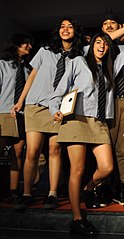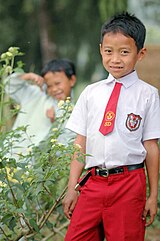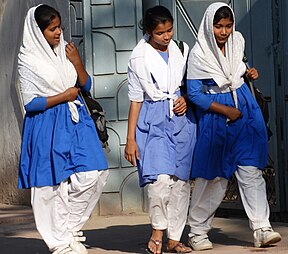School uniforms by country
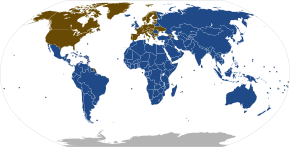
School uniform is a practice that dates to the 16th century in England. Charity schools such Christ's Hospital, founded in 1552 in London, were among the first schools to use a uniform for their students.[1] The earliest documented proof of institutionalised use of a standard academic dress dates back to 1222 when the Archbishop of Canterbury ordered wearing of the cappa clausa.[2]
The practice of wearing school uniform has been adopted by many other countries, and is now common in many parts of the world. Uniforms can be regarded as promoting social equality among students and an esprit de corps, but have also been criticised for promoting a form of uniformity characteristic of militarism.
The decision as to whether to implement school uniform policy or not is a controversial one and also polarised in societies and countries. In countries such as the United Kingdom, South Africa and a number of Asian nations, school children have to wear approved school uniforms that conform to the uniform policy of their school. In modern Europe, Britain, Malta and Ireland stand out as the only countries where school uniform is widely adopted by state schools and generally supported by national and local governments, although there is no legislation governing school uniform in the U.K.[3] There are some independent schools and state schools that do not have school uniforms: their pupils are at liberty to dress in a way considered to be appropriate by the school, themselves and their parents or guardians.[citation needed]
Afghanistan
[edit]In the Islamic Republic of Afghanistan, Afghan schoolgirls were required to wear white headscarves and black knee-length dresses over leggings.[4] In 2017, President Ashraf Ghani blocked a directive by the Ministry of Education obliging girls aged 12 and over to wear floor-length tunics.[5]
Albania
[edit]School uniforms have been compulsory in Albanian high schools since 2009.[6]
Algeria
[edit]Algerian primary school students are obliged to wear an apron over their clothes. These are colour-coded by gender: blue for boys, pink for girls.[7]
Andorra
[edit]School uniforms are not generally worn in Andorra. Their use is confined to the principality’s international schools.[8][9]
Angola
[edit]Uniforms are required in Angolan public and private schools.[10][11]
Anguilla
[edit]Anguillan schools oblige students to wear uniforms.[12]
Antigua and Barbuda
[edit]School uniforms are ubiquitous in Antiguan and Barbudan schools. In 2004, the School Uniform Grant Programme was introduced to help citizens meet the associated costs.[13]
Argentina
[edit]Argentinian primary school students have traditionally worn white smocks as uniforms. Teacher Matilde Filgueiras pioneered the garment's design in 1915, which were made mandatory nationwide in 1942.[14][15]
Aruba
[edit]Aruban schools generally oblige students to wear uniform polo shirts, while pants and skirts must meet certain requirements.[16] In September 2021, students at Colegio Arubano successfully protested against changes to the school dress code they felt were overly restrictive.[17][18]
Armenia
[edit]In the Armenian Soviet Socialist Republic, students wore school uniform. Since independence in 1991, their use has largely declined in Armenian public schools.[19]
Australia
[edit]
In Australia, each school or school system can set its own uniform policy. Wearing a uniform is compulsory in most Australian private and all Catholic schools, as well as in most public schools, as well as primary schools. Uniforms usually have a colour scheme based on the school colours. Uniform and appearance are generally strictly enforced in private and Catholic schools, though less so in public schools, which generally allow their students a reasonable amount of leeway. Most, if not all, private schools have the school logo incorporated in the uniform ensemble, typically on the tie and the blazer breast pocket.
For boys, the uniforms generally include a button-up or polo shirt with either shorts (especially for summer wear) or long trousers, usually in grey or navy blue or the school colour. Some schools allow boys to wear shorts only in younger years, and they must wear long trousers once they are a senior (17-18). At others, even older boys wear shorts in summer due to the heat.[20] Where short trousers are to be worn, socks in school colours (more commonly white) are often required. Girls' uniforms generally include a checkered or striped dress (usually sleeveless or short-sleeved) worn over a blouse for summer and, in most secondary schools, girls wear a skirt as well as a button-up or polo shirt in winter with a blazer and tie. In a number of schools, girls are also permitted to wear a button-up or polo shirt and dark trousers.
In public schools, the uniform is usually a polo shirt for juniors and a different one for seniors and trousers or skirt. This set may be complemented by a school tie and, typically, a v-neck jumper (pullover or sweater) or a blazer. In the summer, boys usually do not wear ties, pullovers, or blazers. Instead, they wear a short-sleeved version of the shirt and short trousers. A neck-tie, blazer, and hat are also common in private and Catholic schools.
In most high schools a PE uniform is the norm for sports days only. At many high schools, children are required to change into and out of their PE uniform around the PE lesson. The PE uniform usually consists of shorts and a polo shirt, as well as a light weatherproof rain jacket (mainly at private or Catholic schools), usually made of polyester, for winter and wet weather and sometimes a netball skirt for girls. It is common for students in their final year of primary school or secondary school to have their own jersey, jumper or jacket to denote their final-year status.
Christmas Island
[edit]School uniform is compulsory at Christmas Island District High School, the island's only secondary school.[21]
Cocos (Keeling) Islands
[edit]School uniform is compulsory at Cocos Islands District High School, the territory's only secondary school.[22]
Norfolk Island
[edit]School uniform is compulsory at Norfolk Island Central School, the island's only school.[23]
Austria
[edit]Austrian public schools do not generally employ dress codes.[24]
Azerbaijan
[edit]School uniforms are mandatory across the Azerbaijani public school system.[25]
Bahamas
[edit]As a former British colony, school uniforms are worn throughout Bahamian public and private schools.[26]
Bahrain
[edit]Uniforms are mandatory in all Bahraini public schools. Prior to 2011, this only applied to girls' schools and boys' elementaries. In January 2011, the Ministry of Education announced uniforms would be required in boys' middle and high schools in the subsequent academic year.[27]
Bangladesh
[edit]School uniforms are mandatory in all public and private schools (up to 12th standard) in Bangladesh. While the colour and exact cut of the uniform depend on school regulations and policies, male students in Bangladesh are usually expected to wear full/half sleeve shirts with trousers and female students are expected to wear skirts/trousers with shirts or salwar kameez with belts and dupattas.
The uniform rule only applies to students of primary, secondary, and higher secondary education. Although there are no uniforms for university students in Bangladesh, they are expected to follow the respective dress codes of their institutions.
The rationale behind the uniform policy of Bangladesh is that the authorities want to protect the students from class stratification that can become apparent when students are given the choice to dress as they like. In addition, authorities believe that students should not misuse their time in trying to dress up for school.
Barbados
[edit]School uniforms are mandatory in Bajan schools.[28]
Belarus
[edit]In August 2022, education minister Andrei Ivanyets announced plans for every Belarusian school to have its own compulsory school uniform by 2023.[29] In 2024, select schools in Minsk participated in a pilot scheme for a standardised school uniform.[30]
Belgium
[edit]As of 2018, less than ten Belgian schools (principally Catholic institutions such as Collège Saint-Benoît de Maredsous) enforced compulsory school uniform policies.[31]
Belize
[edit]School uniform is mandatory in Belizean schools.[32] Traditionally, many students' uniforms were custom-made by local seamstresses and tailors.[33]
Benin
[edit]School uniform is ubiquitous in Beninese schools. In June 2018, Minister of Secondary Education Mahougnon Kakpo announced khaki-coloured uniforms would be worn by students in both public and private secondary schools.[34]
Bermuda
[edit]As a British Overseas Territory, schools uniforms are ubiquitous in Bermudan schools.[35]
Bhutan
[edit]Bhutanese schoolchildren wear uniforms based on the country's national dress: gho for male students and kira for female students.[36]
Bolivia
[edit]Schools uniforms are worn in most Bolivian schools.[37] However, schools cannot legally stop students who refuse to wear uniform from attending classes.[38]
Bosnia and Herzegovina
[edit]In the Socialist Federal Republic of Yugoslavia, some schools enforced a mandatory uniform consisting of a navy blue "apron".[39]
As of 2013, several primary schools in Republika Srpska regions had introduced uniforms, consisting of logoed T-shirts and sweatshirts.[40]
Botswana
[edit]School uniforms are widespread in Botswanan schools. In October 2021, the Ministry of Investment, Trade and Industry announced a ban on the importation of school uniform.[41][42]
Brazil
[edit]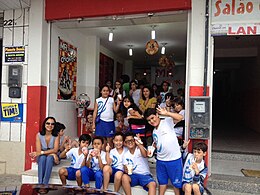
There is no legal requirement for school uniforms in Brazil. On a state-by-state or city-by-city basis, governments may issue uniforms to public school pupils but may not require their use.[43] Private schools are free to set their own uniform policy.
Brazilian school uniforms can vary widely by school. There are many schools that opt for a more elegant outfit, while others opt for a simpler one (social shirt, shorts). In this country, where schools have set a uniform, it is the student's obligation to wear it.
Most schools in Brazil choose the use of uniforms. The average Brazilian school uniform for boys is a T-shirt with the school's logo, sweatpants or Bermuda shorts and a sweatshirt or hoodie. The uniform for girls is very similar, but instead leggings or short shorts are worn, although ballerina pants are also popular. Girls may also wear mini-skirts/skirts. Most schools require trainers.
British Virgin Islands
[edit]Both public high schools on the British Virgin Islands, Elmore Stoutt High School and The Virgin Islands School of Technical Studies, enforce uniform policies.[44][45]
Brunei
[edit]School uniforms are worn in Bruneian public and religious schools.[46]
- Boys: shirt, pants, songkok
- Girls: Baju kurung, hijab
Bulgaria
[edit]School uniform is not widely worn in Bulgarian public schools, although several schools adopted compulsory uniform policies in the 2010s.[47]
Burkina Faso
[edit]Uniforms are compulsory in all Burkinabè public and private schools.[48]
Burundi
[edit]School uniforms are compulsory for school children in Burundi.[49] Burundi, like most African countries, has a compulsory school uniform policy. Burundi's school uniform policy dates back to the colonial days. During those days, chiefs' sons wore a white uniform and all other children wore khaki.[50] The uniform policy is still in force in Burundi to date. However, schools decide on what uniform the pupils wear. It is also argued that the cost of buying the school uniform and poverty, especially in the rural areas, negatively affect school enrollment.[51]
Cambodia
[edit]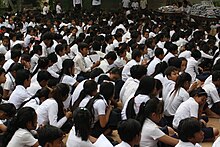
In Cambodia, students of all ages (pre-school to college) wear school uniforms.[52] The uniforms differ by school and age level. Generally, boys wear a white dress shirt and a pair of shorts. The colour and length of the shorts varies at each school. Male college students wear the same kind of uniform, but instead of shorts, they wear black dress trousers. Girls usually wear white blouses and a skirt. Their skirts vary in colour and length depending upon the school and their ages. Generally, the younger students wear long skirts that almost reach their ankles and older students, particularly in college, wear shorter ones. Skirts are generally blue or black but may be other colours as well, depending on the school. Some schools also have alternative uniforms that students of both sexes wear every other day. These often consist of a coloured shirt and slacks. High school girls must wear black or blue long skirts. High school boys wear long black or blue trousers. The white shirt can be short-sleeved or long-sleeved for both sexes. High school students are also required to wear name tags on the left-hand side of their shirts.
Cameroon
[edit]School uniforms are worn universally in Cameroonian schools.[53]
Canada
[edit]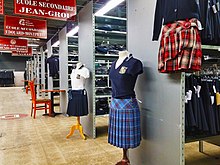
In Canada, provinces have exclusive jurisdiction over education and schools and decision with regard to mandatory uniforms are generally left to either school boards or individual schools. In general, public schools, who may have a dress code, do not have mandatory uniforms. The exception is Quebec, where French-language primary and secondary schools, especially in Montreal and Quebec City, have gradually been adopting mandatory uniform codes since the mid- 2000s.[54] By 2015, 21 of the 29 secondary schools of Montreal's main French-language school board had implemented mandatory uniform code.[55] In the province's English public school sector most high schools have gradually adopted such a code, some waiting until 2022 [56] and 2023 [57] to do so.
In the rest of Canada, school uniforms are not required in most public schools or separate schools, except in exceptional circumstances such as school performances or international field trips. However, the majority of Catholic high schools in southern Ontario (Grade 9-12) do require uniforms.[58] These uniforms generally have long- or short-sleeved shirts with the school logo or crest near the collar and trousers or kilted skirts. Schools often allow girls the option of choosing to wear a skirt or trousers. Some schools also mandate dress shoes and a particular type and length of socks to go with the uniform. A cardigan sweater, vest, or blazer may be part of the ensemble, particularly in winter. Additionally, as of 2011, the Toronto Catholic District School Board has implemented an Appropriate Dress Code of navy blue and white in all elementary separate schools that do not already have their own uniforms.[59]
Otherwise, specific regulations and policies regarding school-appropriate dress and the extent of dress code enforcement will vary by school.
Uniforms are used in most private schools, and also in special or alternative programs of public and Catholic schools.
Cape Verde
[edit]School uniform is worn in Cape Verdean schools from pre-school through secondary school.[60]
Cayman Islands
[edit]All Caymanian primary and high schools, whether government-funded or private, have specified school uniforms, as well as shoe and hat policies.[61]
Central African Republic
[edit]In April 1979, Bokassa I ordered the arrest of a group of students protesting the extravagant cost of their mandatory school uniforms, over 100 of whom were later murdered. Public anger over the massacre contributed to Bokassa's subsequent overthrow in September 1980.[62][63] As of 2006, school uniforms are widely worn in Central African secondary schools.[64]
Chad
[edit]A school uniform prescribed by the Ministry of National Education is compulsory in Chadian public and private schools.[65]
Chile
[edit]In Chile, most schools have a uniform.
Until 1930, it was uncommon for students to wear a uniform. Under the government of Carlos Ibáñez del Campo, all students became obliged to wear a school uniform. During the administration of Eduardo Frei Montalva, a unified uniform was introduced for all public and private schools and other education centers. Today, these uniforms have disappeared in private schools, who prefer to use a customised one.
China
[edit]
Uniforms are a common part of the schools in China. Almost all secondary schools as well as some elementary schools require students to wear uniforms. Uniforms in mainland China usually consist of five sets: 2 formal sets and 3 everyday sets. A formal set is worn on Mondays or special occasions (school anniversaries, school ceremonies, etc.) They consist of a white collared shirt with a sweater on top and a skirt for girls or a suit for boys. There is one formal set for summer and one set for winter. Everyday uniforms for boys in the winter usually consist of a zippered sweater and trousers and a collared shirt (usually white). Thinner materials are worn in the spring and fall and short or long trousers may be worn in the summer. The everyday uniforms for girls are very similar to the boys' uniform. It is relatively common for there to be some kind of sponsored advertisement on some non-formal school uniform shirts, though this trend has fluctuated in recent years.
Hong Kong
[edit]
The vast majority of schools in the former British colony adopted uniforms similar to that of British schools, while Catholic schools in Hong Kong usually follow the tradition of Catholic school uniforms.
A number of older Christian girls' schools established around the midpoint of the 20th century, however, retain the heritage of using the Chinese cheongsam as their uniform, such as St. Stephen's Girls' College, True Light Middle School, Ying Wa Girls' School, and Heep Yunn School.[66] Sailor suits are also used as uniforms in some kindergartens for boys and girls, and secondary schools but for girls only, for example the Bishop Hall Jubilee School and New Method College.
St Paul's Girls' College, now St Paul's Co-educational College, introduced a cheongsam as its uniform in 1918, making it Hong Kong's first school uniform.[67] True Light Girls' College was the first Hong Kong secondary school to have a cheongsam uniform.[66]
While Hong Kong campuses of British public schools use hats for reasons of tradition, most Hong Kong schools have no hats in their uniforms.[68]
Macau
[edit]School uniforms are worn in Macanese schools from kindergarten onwards.[69]
Colombia
[edit]In Colombia, all students are required to wear uniforms in public and private schools. The styles of uniform vary regionally but all consist of three sets: an everyday uniform, a sports uniform for physical education, and a "gala uniform" (Spanish:uniforme de gala) for formal school events, such as patriotic days and important national dates.[70]
- Everyday uniform
- Girls
- White T-shirt with a vest
- Knee-length skirt and white calf-length socks
- Boys
- White T-shirt, usually with the school's symbol on the left side.
- Dark-coloured long trousers
- Girls
With gala uniforms, the T-shirt is changed for a long sleeve shirt, sometimes a bowtie or a lace is worn too. The shoes for both girls and boys are black lace-up shoes (sometimes the shoes may be dark blue, black or wine-coloured, depending on the uniform colours). The sports uniform includes sweatpants, a collared T-shirt, and white sports shoes. The designs and the colours of the uniforms depend on the school's colours and the principal's preference.
Comoros
[edit]Comorian schools require uniforms.[71]
Democratic Republic of the Congo
[edit]School uniform is compulsory in Congolese schools. Controversially, many schools oblige students' parents to buy uniforms directly from the institutions.[72]
Republic of the Congo
[edit]In October 2016, the Ministry of Education instituted a standardised uniform in all public and private schools across the Republic of the Congo.[73]
Cook Islands
[edit]Owing to its British colonial heritage, schools in the Cook Islands require uniforms.[74]
Costa Rica
[edit]School uniform is mandatory in Costa Rica from pre-school through secondary school.[75]
Croatia
[edit]In Croatian schools, children generally do not wear uniforms. Their use is confined to independent schools, such as those operated by the parent-run Rino Institut.[76][77]
Cuba
[edit]School uniforms are mandatory in Cuba.[78]
Curaçao
[edit]School uniforms are compulsory in Curaçaoan public schools.[79]
Cyprus
[edit]Uniforms are compulsory in Cypriot schools.[80] Student organisation PEOM campaigns for the abolition of school uniforms.[81]
Czech Republic
[edit]School uniforms are not in use in Czech public schools but are in several private schools.[82]
Denmark
[edit]Herlufsholm School is the only school in Denmark with a compulsory school uniform.[83]
Djibouti
[edit]Uniform is compulsory in Djiboutian schools. In 2020, presidential decree N° 267/2018 imposed a standardised beige uniform in all high schools.[84]
Dominica
[edit]Uniform is mandatory in Dominican schools. When the island's schools were closed during the COVID-19 pandemic, education minister Octavia Alfred announced students would be obliged to wear their uniforms while participating in online classes.[85]
Dominican Republic
[edit]School uniform is mandatory in Dominican public schools. All students wear khaki pants, regardless of sex or gender identity.[86] Students nationwide wore blue shirts until 2017 when the Ministry of Education introduced a colour-coded system of polo shirts based upon a school's geographical location:[87]
- Central Cibao: burgundy
- Northern Cibao: golden yellow
- South Region: turquoise blue
- East Region: green
- Greater Santo Domingo: royal blue[88]
The new shirts were issued free to students at a reported cost of RD$639,576,485.00.[89]
East Timor
[edit]School uniforms were compulsory during the Indonesian occupation of East Timor.[90] Following independence, the use of uniforms persisted.[91]
Ecuador
[edit]School uniforms are mandatory in Ecuadorian public schools.[92] In April 2018, the Ministry of Education ruled skirts cannot be made compulsory for female students.[93]
Egypt
[edit]In the late 20th century, Egyptian schoolgirls predominantly wore an "apron" (Arabic: المريلة almarilati) — a type of smock — while their male peers wore shirts and pants. More recently, unisex polo shirts and pants have grown in popularity.[94][95]
El Salvador
[edit]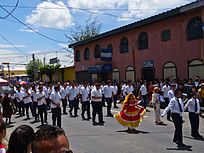
In El Salvador, all students from public schools and private schools are required to wear uniforms.
Equatorial Guinea
[edit]Uniforms are mandatory in Equatoguinean schools.[96]
Eritrea
[edit]School uniforms are mandatory in Eritrea.[97]
Estonia
[edit]In the Estonian Soviet Socialist Republic, mandatory school uniforms were introduced in the late 1950s. Uniforms were initially abandoned at the end of the 1980s but had already come back into use in some schools by the mid-1990s.[98] This trend continued into the 2010s.[99][100]
Eswatini
[edit]School uniforms are compulsory in all Emaswati schools.[101]
In July 2000, Senator Majahenkhaba Dlamini instructed the education minister to issue a directive compelling schoolgirls aged eleven and older to wear knee-length uniform skirts, ostensibly to fight the spread of HIV/AIDS.[102][103]
Ethiopia
[edit]Uniforms are compulsory in Ethiopian schools.[104]
Fiji
[edit]Uniform is compulsory in Fijian public schools. In January 2022, the Ministry of Education, Heritage and Arts relaxed this rule for the first three months of the academic year.[105]
Finland
[edit]In the mid-20th century, the former Hallituskatu Girls' School enforced a compulsory school uniform.[106]
As of 2022, the Board of Education holds that it would be illegal for a Finnish public school to enforce a mandatory uniform policy.[107]
France
[edit]School uniforms have not been compulsory in state schools in France since 1968.
Uniforms have not been enforced in French schools, a few exceptions (such as Maison d'éducation de la Légion d'honneur, les Écoles TUNON, and Vatel). Xavier Darcos, a former teacher and Minister of Education from 2007 to 2009, is an advocate of the reintroduction of uniforms: "This is not outrageous. This removes the visible differences in social status or wealth. This is an additional factor of integration".[108]
The wearing of any religious symbols, such as a hijab or turban, has been banned in French schools since 2004.
Since March 2012, the students of the Boarding School of Excellence Sourdun wear a uniform with the insignia of their establishment.
Les lycées de la défense, formerly known as military schools, require their students to wear uniforms.
In 2024, the French government made some moves to bring back school uniforms by running tests in a few cities.[109][110][111]
French Guiana
[edit]French Guianan schools enforce a standardised uniform of coloured T-shirts and blue pants.[112]
French Polynesia
[edit]In 2012, French Polynesia's Minister of Education Tauhiti Nena ordered the overseas collectivity's public schools to adopt mandatory uniform policies.[113] The following October, the Court of Administrative Law annulled the order, by which stage 24 schools had adopted uniform policies.[114] As of August 2015, 13 schools retained these policies.[115]
Guadeloupe
[edit]Use of uniforms and dress codes have become widespread in Guadeloupean schools.[116]
Martinique
[edit]As of 2014, a third of the 345 schools on the French overseas department Martinique impose a non-compulsory uniform policy.[117]
New Caledonia
[edit]In 2017, uniform polo shirts were made compulsory for students attending all 96 primary schools in New Caledonia's South Province.[118]
Réunion
[edit]As of 2012, Collège Sainte-Geneviève in Saint-André is the only Réunionese school to operate a uniform policy: students are obliged to wear logoed white T-shirts.[119]
Saint Barthélemy
[edit]Collège Mireille-Choisy, Saint Barthélemy's only public secondary school, enforces a dress code requiring students to wear a logoed T-shirt and prohibiting certain types of legwear and footwear.[120]
Saint Martin
[edit]Uniforms are worn in Saint-Martinois schools.[121][122]
Gabon
[edit]School uniforms are widely worn in Gabon. A ban on Gabonese schools compelling students to buy uniforms directly from the institutions has led to some students making their own uniforms.[123]
The Gambia
[edit]School uniforms are mandatory in The Gambia.[124]
Germany
[edit]This section needs additional citations for verification. (September 2010) |

There is no tradition of wearing school uniforms in Germany, and today, almost all students of state schools, private schools or universities do not wear school uniforms. However, certain garments have been common to students in former times:
From the 16th century, students (especially of secondary or grammar schools and similar institutions) were often subject to regulations that prescribed, for example, modest and not too stylish attire. In many cases these regulations were part of wider laws concerning the clothing of all citizens of certain social classes.
A blue coat became a widespread obligatory status symbol of students of secondary schools; it fell out of use during the latter half of the 18th century. In more recent times, school uniforms in any real sense did not exist outside of convent schools and private boarding schools. At times, certain fashions became so widespread that they approached uniform status; this is true in particular for so-called student hats (Schülermützen) that became widespread from the 1880s on and remained somewhat popular until they were banned by the Nazis. Their wearing was advocated by teachers and the students themselves and occasionally made mandatory, but never on a national or statewide level. Another instance are the sailor suits that became fashionable around the turn of the 19th century. These, too, were not usually a prescribed uniform.[125]
The Nazis banned student hats – the last remaining, if voluntary, form of unified student clothing – because they considered them an attribute of class society. They did, however, institute mandatory membership in the uniformed Hitler Youth (HJ) from 1936 until their fall. HJ uniforms were worn in the HJ training academies and in the Napolas; students of other schools sometimes wore them to school at their own discretion.[citation needed]
In recent times, the introduction of school uniforms has been discussed, but usually the expression "uniform" (the word is the same in German) is avoided in favor of terms like "school clothing" ("Schulkleidung"). School clothing has been introduced in a small number of schools, for example in Hamburg-Sinstorf in 2000, and in Friesenheim and Haag (Oberbayern) in 2005. In these cases the clothes are collections of shirts, sweaters, and the like, catering to contemporary fashion senses. Uniforms in a more traditional sense are almost never proposed in earnest.
The debate on mandatory school uniforms intensified in Germany when two Muslim girls dressed in burkas arrived at a school in Bonn in 2006. The girls' actions were interpreted as political action and they were subsequently suspended from school. Then-Justice Minister Brigitte Zypries in an interview with the Welt am Sonntag stated that the simple solution to the issue under consideration is mandatory introduction of school uniforms for boys and girls across Germany. She further argued that school uniforms would help to prevent conflicts arising from religious or political differences. Her stance was supported by then-Minister Of Education Annette Schavan. The proposal was met with opposition from the teacher union and opposition political parties. The teacher union argued that school uniforms are not the solution for integration problems nor the issue of fashion obsession. The leader of the teacher union Heinz-Peter Meidinger also added that the school uniforms have been a controversial issue in Germany over the years.[126]
Opposition to school uniforms
[edit]A senior member of the Green Party, Krista Sager, also said that the introduction of school uniforms would be unacceptable state interference in religious matters. She then proposed that individual schools have to find their own solutions and rejected solutions imposed by government. She further noted that school uniforms are no longer up to date and their imposition would be rejected by the current generation of students. The Conference of Education Ministers, a body that decides on school policies, also kicked back against school uniforms. They cited historical reasons dating back to WWII with memories of Hitler Youth's uniform still fresh in people's minds. They also concluded that the imposition of school uniforms would be excessive government encroachment on personal liberty of pupils and parents.[127] However, a number of schools sell branded clothing that can be worn as a sign of school pride.[127]
The Bildungsstreik movement fights against school uniforms due to their belief that it represents some kind of militarism.[126]
Ghana
[edit]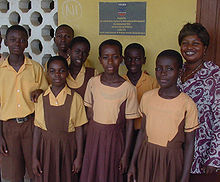
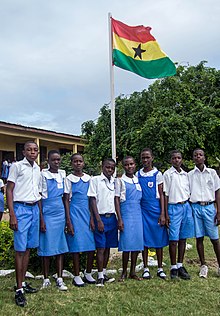
All children have to wear school uniforms in Ghana. Pupils in public schools have the same type of school uniform with the school's emblem imprinted on the left chest. This helps to distinguish pupils of one school from the other. Private schools determine which uniforms their pupils wear.[128][129][130] On April 11, 2019, the Director-General of the Ghana Education Service, Prof Kwasi Opoku Amankwa announced at a press conference in Accra that public Junior High School pupils will start wearing a new uniform beginning from the 2019–2020 academic year.[131] The new uniform is primarily to distinguish the Junior High pupils from their peers at the primary level. The current brown and yellow khaki school uniform, locally referred to as Konkonte and nkate nkwan (groundnut soup) and worn by pupils at the basic level in public schools, was introduced over 30 years ago by the government.[132]
Georgia
[edit]School uniforms are not widely worn in Georgian schools.
They were once widespread in the Georgian Soviet Socialist Republic, but their use had largely faded by the late 1980s.[133]
Greece
[edit]Uniforms ceased to be worn in Greek public schools in 1982. Their use is now confined to certain private and international schools.[134]
Grenada
[edit]Uniforms are worn in all Grenadian public schools.[135] The Grenadian government runs an annual School Uniform Voucher Programme to help students' families meet the associated costs.[136]
Guatemala
[edit]School uniforms are widely worn in Guatemalan schools.[137] However, in 2008, Álvaro Colom prohibited the enforcement of mandatory uniforms in public schools.[138]
Guinea
[edit]School uniforms are worn in Guinean public schools.[139]
Guinea-Bissau
[edit]In October 2020, it was announced a standardized uniform would be introduced across all Bissau-Guinean public and private schools.[140]
Guyana
[edit]Guyana has a long history of school uniforms being compulsory. Students attending public and private schools up to the secondary level are required to wear them. In some instances, this extends to those attending classes on Saturdays and during periods when schools are officially closed.[141] The Guyanese government dispenses grants to assist students with uniform costs.[142]
Haiti
[edit]School uniforms are compulsory in Haitian schools.[143]
Honduras
[edit]On 18 March 2014, the National Congress of Honduras approved a decree introducing a single uniform of white shirts and blue pants or skirts in all Honduran public schools.[144]
Hungary
[edit]School uniforms are not currently worn in Hungarian public schools.
In the Hungarian People's Republic, the "school coat" (Hungarian: iskolaköpeny) was made compulsory for all schoolchildren in September 1973.[145]
Iceland
[edit]School uniforms are rare in Icelandic schools, though some primary schools have taken steps towards adopting dress codes.[146]
India
[edit]
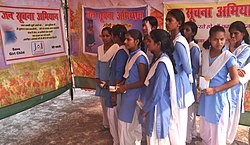
Uniforms are compulsory in India in both public and private schools. The boys' uniforms are often made of a light-coloured shirt, long trousers usually blue, white or black, and those of the girls are often a shirt and a skirt. Most schools employ this form of uniform however Shalwar Kameez is prescribed in some of the rural north Indian areas but rarely seen in urban areas.
Many schools require students to wear uniform shoes, ties and ID cards, and comb their hair down and keep it clean and short. Long hair is tied in braids. Uniform is one of the most important components of school life and is taken very seriously in India. Many government-run schools across different states also provide free uniforms and school bags to the students.[147]
Some institutions also require the use of a tie, especially the schools run by private institutions, and the Indian education system does not prohibit the children on the ground of religion. There is no discrimination on the basis of religion in the field of education in India. That's why all the children are allowed to wear the same uniform, no matter what religion you belong to. However, most of the schools, whether public or private, prohibit students to have dyed hair or males to have a ponytail.
Indonesia
[edit]In Indonesia, national school uniforms are mandatory for every student during Monday to Thursday.[148] They can be simply described as below for each stage of education:
- Elementary schools or Sekolah Dasar (SD) students wear a white short-sleeve shirt with red shorts for male students, and below-knee skirts for females.
- Junior high schools or Sekolah Menengah Pertama (SMP) require navy blue shorts or trousers with a short-sleeve white shirt for male students. Females wear a below-knee-length or long navy blue skirt and short-sleeve white shirt.
- Senior high schools or Sekolah Menengah Atas (SMA) require blue-grey trousers with a short-sleeve white shirt. Females wear a below-knee-length or long blue-grey skirt, and wear short-sleeve or long-sleeve white shirts.[149]
Public schools in Indonesia tolerate religious freedoms. For example, Muslim girls may opt to wear long-sleeve shirts, longer skirts, and jilbab to cover their heads. Some schools in Indonesia also have a batik uniform, usually worn on Friday or Saturday. This kind of uniform consists of a batik short-sleeve or long-sleeve shirt, with long or short trousers for SMA and below-knee or long skirts for females. The motifs and colours of batik depend on the school. Some schools tend to issue ties and/or vests for their students. These ties and vests may vary from school to school in colour and sewing pattern, even among public schools.
Nowadays, with the increase of private schools in Indonesia, most private schools have their own signature school uniform. Most consist of shirts with shorts or trousers for males, and skirts for females, only with differences on the colour.
Every school has its own standard grooming. Males are not allowed to have long hair. Accessories are also normally prohibited for males, except for watches. Females are usually allowed to use simple accessories such as watches, earrings, and sometimes bracelets. Wearing nail polish is usually not allowed.
Most schools pay attention to the shoes that can be worn. Black or white sneakers with white laces are the most common shoes. Few higher-level students, such as in SMA or SMK, are normally required to wear black leather shoes.
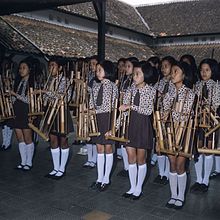
The school badge is usually put on the right sleeve of a shirt, consist of school's name and location, and some have their own school's logo. Others prefer to wear the school's logo as a lapel or breast plastic or metal pin. The emblem of OSIS (Organisasi Siswa Intra Sekolah), or School's Intern Student Organization, is put on the shirt's left pocket. Students' names are usually on the right side of the shirt and embedded by sewing, ironing or as a detachable badge. Some schools (usually "SMP" and "SMA") distinguish the grade of their students by stripes on the official ties issued or an emblem below the school emblem (it can be stripes, chevrons or numbers).
Since school year 2014/2015, elementary and middle schools are require the students to wear an Indonesian flag school badge sewn on top of their left pocket.[150]
The scouts (pramuka) uniform is used in many schools in Indonesia at least once a week. It consists of light-brown short-sleeve or long-sleeve shirts, with dark-brown shorts or trousers, and below-knee skirts or longer for females. The common day to wear the scout uniform usually falls on Friday or Saturday. Furthermore, on certain occasions (usually on ceremonies or competitions), the uniform should be worn as full dress, with red and white scarf/tie, dark brown beret, rope, dagger and scout's stick.
The scout uniform has two breast pockets. Above right pocket is the student's name. The Gerakan Pramuka Indonesia (Indonesian Scout Movement) logo is sewn on the left pocket (for male students). On the right sleeve there are scouting organization's location, number and logo, while on the left sleeve usually are the student's scouting team logo and chevrons denoting his/her grade. Male students wear International Scout Organization logo above their name and female students on their lapel.
Ireland
[edit]In Ireland, almost all primary and secondary schools require students to wear a uniform. These can vary from school to school but for the most part include trousers for male students, a skirt or pinafore for female students and a shirt, a jumper and a tie. In recent years many schools also offer the option of trousers for female students. Some schools require blazers rather than jumpers. Some primary schools now let their pupils wear a school tracksuit rather than a formal uniform. Primary and Secondary schools under the patronage of Educate Together, have no school uniforms in their network of over 100 schools.[151]
In recent years there has been criticism, including by the Department of Education of the requirement that a school uniform jumper must have the school crest or name imprinted onto it and of the practice where a school's uniform can only be bought from a certain supplier, which can markedly increase the price of a uniform. As well as rules regarding the wearing of a uniform, many schools have regulations regarding hair, footwear, the growth of facial hair for males, the wearing of makeup and the length of school skirts.[152]
Israel
[edit]According to former Education Minister Limor Livnat, about 1,400 Israeli public schools require pupils to wear uniforms.[153]
School uniforms used to be the norm in the state's early days, but have since fallen out of favor. However, in recent years, the number of schools using school uniforms has been increasing once more. Many teachers, parents and students are in favor of returning the school uniform to common use to prevent the deepening of the gap between affluent children and those less well-off. Nowadays school uniforms are mainly associated with "national religious" schools within the Israeli system of education.[154] Schools for Arab citizens of Israel also frequently require uniforms: for girls, it is often a pinafore to be worn over trousers and shirt.
In the Haredi or ultra-Orthodox school system, uniforms are compulsory in essentially all girls' schools. In the vast majority of these, the style adopted by the Beit Ya'akov network is used: a sky-blue, button-down, open-collar, loose-fitting blouse with an Oxford-blue, pleated skirt that comes to just below the knee and dark stockings. In cold weather, a Yale-blue sweater may be added. A small fraction of schools alter the colour scheme to pink and burgundy, while otherwise retaining the same overall appearance. In boys' schools there is usually not an identifiable school uniform, distinct from what is considered acceptable for ordinary street wear. However, the standards of acceptable street wear for boys and men in Haredi communities are so precise and exacting that in almost all cases all of the boys in a particular school will be dressed identically.
In non-Haredi schools today, school uniforms in Israel consist only of a shirt with the school logo. In the summer, the uniform shirt is a simple T-shirt, while in the winter, the shirts worn are warm or hooded sweaters. Although the shirts are uniform, they usually come in various colours, and allow students to customize and express themselves even while wearing a uniform. The shirts sell for a very small amount of money, so that even the less well-off can acquire them.
Italy
[edit]In Italy, school uniforms are uncommon, partially because child uniforms are associated with the era of Benito Mussolini before World War II when children were placed according to their age into Italian Fascist youth movements and had to wear uniforms inside and outside school.
However, until the early 1960s many high schools required girls to wear black grembiule (resembling a doctor smock) on top of their clothes: no uniform was required for boys.
Nowadays, many pre-schools advise parents to dress their children with a grembiulino, i.e., a small grembiule, usually shorter and more colourful, that can be purchased cheaply.
Some elementary schools advise some kind of grembiule for the younger pupils. Sometimes girls are required to wear a pink or white grembiulino, while boys may be required to wear a short cotton jacket, usually blue or black. In other cases both boys and girls may be required to wear a more neutral blue grembiule.
Some parents send their children to school in a grembiule even if the school does not require it.
Poet and children's writer Gianni Rodari has described adult life as "a school without grembiule and school desk".[155]
In 2004 the Italian chapter of WWF warned that synthetic grembiuli were harmful to pupils.[156]
In July 2008 Education Minister Mariastella Gelmini proposed the re-introduction of the compulsory smock in public schools, provoking a debate in the Italian press.[157]
In 2014, with the association of IT-PAN, the grembiuli wasn't needed after
Iran
[edit]Iranian schools generally employ uniform policies but students cannot legally be compelled to wear them.[158]
Iraq
[edit]School uniforms are worn in Iraqi public schools.[159]
Ivory Coast
[edit]In October 2003, the Ivorian government abolished the compulsory wearing of school uniforms in all schools.[160] By 2012, compulsory school uniforms had been re-implemented.[161]
Jamaica
[edit]School uniform is compulsory in all Jamaican schools.[162] In public schools, uniform requirements are set by an institution's school board.[163]
Japan
[edit]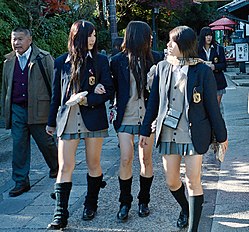
Japan introduced school uniforms in the late 19th century. Today, school uniforms are almost universal in the public and private school systems. They are also used in some women's colleges. The Japanese word for uniform is seifuku (制服).
In the majority of elementary schools, students are not required to wear a uniform to school. Where they are required, many boys wear white shirts, short trousers, and caps. Young boys often dress more formally in their class pictures than they do other days of the school year. Girls' uniforms might include a grey pleated skirt and white blouse. Occasionally the sailor outfit is used for girls. The uniform codes may vary by season to work with the environment and occasion. It is common for boys and girls to wear brightly coloured caps to prevent traffic accidents. It is normal for uniforms to be worn outside of school areas. However, this is going out of fashion and many students are wearing casual dress.[citation needed]
The Japanese junior- and senior-high-school uniform traditionally consists of a military style for boys and a sailor outfit for girls. These uniforms are based on Meiji era formal military dress, themselves modeled on European-style naval uniforms. The sailor outfit replace the undivided hakama (andon bakama 行灯袴) designed by Utako Shimoda between 1920 and 1930.[164] While this style is still in use, many schools have moved to more Western-pattern parochial school uniform styles. They consist of a white shirt, tie, blazer or sweater vest with school crest, and tailored trousers (often not of the same colour as the blazer or sweater vest) for boys and a white blouse, tie, blazer with school crest, and tartan skirt for girls.
Much like the male uniform, the gakuran, the sailor outfit bears a similarity to military-styled naval uniforms. The uniform generally consists of a blouse attached with a sailor-style collar and a pleated skirt. There are seasonal variations for summer and winter: sleeve length and fabric are adjusted accordingly. A ribbon is tied in the front and laced through a loop attached to the blouse. Several variations on the ribbon include ties, bolo ties, neckerchiefs, and bows. Common colours are navy blue, white, grey, light green and black.
Shoes, socks, and other accessories are sometimes included as part of the uniform. The socks are typically navy or white. The shoes are typically brown or black penny loafers. Although not part of the prescribed uniform, alternate forms of legwear (such as loose socks, knee-length stockings, or similar) are commonly matched by more fashionable girls with their sailor outfits.
Regardless of what type of uniform any particular school assigns its students, all schools have a summer version (usually consisting of a white dress shirt and dark slacks for boys and a reduced-weight traditional uniform or blouse and tartan skirt with tie for girls) and a sports-activity uniform (a polyester track suit for year-round use and a T-shirt and shorts for summer activities). Depending on the discipline level of their school, students may wear seasonal and activity uniforms in the same classroom during the day. Students may attempt to subvert the system of uniforms by wearing them incorrectly or by adding prohibited elements such as large loose socks or badges.
Miniskirts have been very popular in Japan, where they became part of school uniforms, and they came to be worn within the Kogal culture.[165][166]
Jordan
[edit]Uniforms are compulsory in Jordanian public schools. Male students in elementary and secondary schools wear khaki uniforms. Female elementary students wear blue uniforms and their secondary counterparts wear green ones. Girls are also allowed to wear jilbabs provided they are either grey or dark blue.[167]
Kazakhstan
[edit]The first recorded use of school uniform in Kazakhstani schools was in 1918.[168] In the Republic of Kazakhstan, uniforms are worn throughout the public education system.[169][170] In January 2017, the Ministry of Education announced a ban on the wearing of religious symbols in schools.[171]
Kenya
[edit]School uniforms are generally compulsory in Kenyan public primary and secondary schools.[172] A 2018 World Bank study found that Kenyan students receiving subsidized school uniforms reduced absenteeism by 37%.[173]
Kiribati
[edit]Uniforms are worn in I-Kiribati schools.[174]
Kosovo
[edit]Some Kosovan schools require uniforms.[175][176] 'Religious uniforms' are officially banned in Kosovan public schools.[177]
Kuwait
[edit]Most schools in Kuwait have a uniform.[178]
Kyrgyzstan
[edit]In 2015, school uniforms became mandatory in Kyrgyz public schools.[179]
Laos
[edit]School uniforms are worn in Laotian schools.[180]
Latvia
[edit]On 11 November 1928, a standardised school uniform was introduced across all Latvian schools: for girls, a dark blue dress with a white collar and dark apron; for boys, a dark suit with a high collar. Uniforms continued to be mandatory throughout the Latvian Socialist Soviet Republic era. After largely falling out of use following independence, many schools have readopted uniform policies in the early 21st century.[181]
Lebanon
[edit]In Lebanon, most schools adopt school uniforms. They are usually composed of a shirt (usually with a pattern) and/or a polo shirt, a jumper, skirts for girls and trousers for boys.
Some public schools do not require school uniforms.
Lesotho
[edit]In Lesotho school uniforms are still compulsory.[182] Many poor families can not afford them, which is one of the reasons for the high dropout rate in primary schools.[183]
Liberia
[edit]Uniforms are compulsory in Liberian schools. In October 2021, the Ministry of Education rebuked certain private and faith-based schools for compelling students to purchase uniforms directly from the institutions.[184]
Libya
[edit]Uniforms are worn in Libyan schools.[185][186]
Liechtenstein
[edit]School uniforms are not widely worn in Liechtenstein.
In September 2011, a primary school in Triesen adopted a voluntary uniform of logoed polo shirts following a campaign by the local parents' association.[187][188]
Luxembourg
[edit]Luxembourg has no history of school uniforms in its public and private school systems.[189]
Madagascar
[edit]Malagasy public and private schools require uniforms.[190]
Malawi
[edit]In Malawi, school uniform is widespread but not necessarily compulsory. The UNICEF-backed government scheme Social Cash Transfer Programme frequently subsidizes the cost of uniform.[173]
On 29 June 2021, female members of the National Assembly dressed in primary school-style uniforms to promote girls' education. Minister of Education Agnes Nyalonje was sent out of the chamber for not complying with the dress code.[191]
Malaysia
[edit]In Malaysia, school uniforms (Malay: Pakaian Seragam Sekolah) are compulsory for all students who attend public schools. Western-style school uniforms were introduced to present-day Malaysia in the late 19th century during the British colonial era. The present design was standardised beginning in January 1970. Today, school uniforms are almost universal in the public and private school systems.
The uniforms at Malaysian public schools are as follows:[192]

Students are required to wear white socks and white shoes, or black socks and black shoes with the above uniform. For modesty reasons, most schools require female students who wear the baju kurung to wear a plain-coloured camisole underneath.[193][194][195][196]
In addition to these, schools usually have badges that must be sewn or ironed on to the uniform — generally at the left chest. Some schools require students to sew their name tags in addition to the badge. For upper forms, students generally have to wear a school-specific tie, except those who are wearing the baju kurung.
In Malaysia, Muslim girls tend to wear the baju kurung. Most of them start wearing a white tudung (Malaysian version of the Muslim headscarf or hijab) upon entering secondary school, for religious reasons. Non-Muslim girls tend to wear the pinafore. Some non-Muslim girls wear the baju kurung but without the tudung.
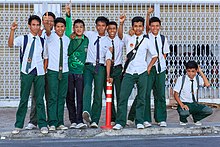
Muslim boys may wear baju melayu at school on Fridays, often with a songkok hat, to be dressed for going to the mosque for prayers at lunchtime.
Girls who choose to wear the pinafore, especially those attending co-ed schools, usually wear shorts under their pinafore to allow for carefree movement as the skirt only covers up to the knee. Those who wear the baju kurung tend not to wear shorts under their long skirt as their skirt covers their legs.[citation needed]
Students who hold positions in schools such as School Prefects, Librarian and Head Class often wear different uniforms than regular students. Therefore, some schools have prescribed the wearing of Ties for students who have positions in the school and some schools require the wearing of Ties to all students. Some schools have ties as standard issue; even then, the ties are generally reserved for school events and public appearances, and are not part of the everyday school uniform. The tropical climate makes them uncomfortable.
The hairstyle of students is given attention by schools and the Ministry of Education.[197] Schools do not allow students to dye their hair. For boys, there is usually a maximum length allowed, for example, the hair must be a few centimetres above the collar, and no sideburns are allowed. Violation of boys' hair regulations is often punished with a caning; some offer the alternative of an enforced haircut at the school (although the result of the haircut may be deliberately made to be humiliating as part of the punishment).[198] The use of hair gel is prohibited in some of the stricter schools, to prevent excessive hairdressing. Girls' long hair must be properly tied up, often into a ponytail. Some schools dictate the colour and type of hair accessories that can be used. Some prohibit even girls from having long hair. Wearing make up in school is prohibited.
Schools usually enforce their uniform code thoroughly, with regular checks by teachers and prefects. Students who fail to comply may be warned, given demerit points, publicly punished, sent home from school, or caned.[199]
Maldives
[edit]School uniforms are widely worn in the Maldives.[200][201]
Mali
[edit]Unlike most African countries, uniforms are not mandatory in Malian public schools. However, they are compulsory in private schools.[202]
Malta
[edit]Children in Malta are obliged to wear school uniforms.[203]
Marshall Islands
[edit]Marshallese schoolchildren wear uniforms.[204]
Mauritania
[edit]In August 2021, education minister Maa El-ainine Ould Eyih announced a compulsory uniform would be imposed in all Mauritanian public schools.[205]
Mauritius
[edit]School uniforms in Mauritius are generally compulsory. Mauritius being a former British colony, has been using the system from back then. The students have to wear uniforms from primary school until higher secondary level. However, there are a few private schools that are based on the French system and do not require the student to wear school uniform.
Mexico
[edit]
In Mexico, students from all public primary and secondary schools, and some public high schools are required to wear uniform.
Most private schools require uniform even since nursery school, however, many private secondary and high schools are opting to eliminate it.
Mexican uniforms have the school's logo and colours. Most Mexican schools have 2 types of uniforms: one for P.E. and another for regular school days. Many public secondary schools have a different regular uniform for each grade, especially for girls.
Uniforms usually consist of the following (but may vary by school):
- Regular
- Boys
- Polo shirt
- Vest or sweater
- Cloth trousers
- Socks
- Black shoes
- Polo shirt
- Girls
- Polo shirt
- Vest or sweater
- Knee-length skirt or dress (called jumper), pleated most of the time
- Knee high socks (white for most public schools)
- Black mary janes (elementary school) / black laced shoes (secondary school)
- Boys
- P.E.
Note: The uniform is unisex most of the time.
- Polo or shirt
- Open sweatshirt
- Sweatpants
- socks and trainers (preferably white)
Nowadays, a complete school uniform set cost can go up to US$98.39 for girls, and US$102.32 for boys, which contradicts the uniforms implementation original goal during the 1930s: to reduce clothing costs and avoid classism.[206]
On 2019, Mexico City's government announced a new Law that permitted pupils to choose whether to wear the trousers or skirt version of their regular uniform, regardless of their gender. If successful, this new practice might be implemented in other states of the republic.[207]
Federated States of Micronesia
[edit]The use of school uniforms is sporadic in Micronesian public schools.
Pohnpei
[edit]Students at Bailey Olter High School wear uniforms.[208]
Monaco
[edit]School uniform has been compulsory in Monegasque primary schools since 2019. Students are obliged to wear white polo shirts bearing their school's crest.[209]
Moldova
[edit]In 2018, the Democratic Party of Moldova called for all Moldovan schools to adopt school uniform policies. The Ministry of Education backed the call but stressed uniforms could not be made mandatory.[210] A survey of 300,000 students, teachers and parents recorded 82% of respondents as being in favour of introducing uniforms.[211]
Transnistria
[edit]In October 2014, Vladimir Bodnar proposed the introduction of compulsory uniforms in Transnistrian schools.[212] In April 2020, education minister Alla Nikolyuk renewed this proposal.[213]
Mongolia
[edit]In Mongolia, school uniforms are widespread in the public school system.[214]
Montenegro
[edit]In the Socialist Federal Republic of Yugoslavia, some schools enforced a mandatory uniform consisting of a navy blue "apron".[39]
In August 2016, education minister Damir Šehović launched a school uniform pilot programme at Savo Pejanović Primary School in Podgorica, consisting of compulsory polo shirts.[215]
Montserrat
[edit]Students attending Montserrat Secondary School, the island’s only high school, wear uniforms.[216]
Morocco
[edit]Historically, Moroccan primary and secondary schools students have worn the "apron" (Arabic: المريلة almarilati).[217]
Mozambique
[edit]Mozambican schools require students to wear uniforms.[218]
Myanmar
[edit]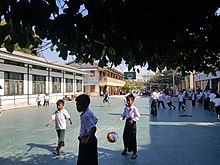
School uniforms are mandatory throughout public schools in Myanmar, from kindergarten until the 10th standard.[219] The current uniform rule, known as the "White-Green", was mandated on 14 February 1966.[220] From kindergarten to the 4th standard, the compulsory uniform for boys is a white shirt and green pants, which can be short or long. Shoes and Burmese sandals may be worn. The uniform for girls is similar, consisting of a white blouse and a skirt or pants. From the 5th standard until matriculation, traditional Burmese attire is considered appropriate school uniform. The uniform for boys is a white shirt (with an english collar or a mandarin collar) and a green sarong called a pahso, along with Burmese sandals. For girls, a traditional Burmese blouse (either the yinzi, with a front opening, or the yin hpon, with a side opening) and a green sarong called a htamein are worn, along with Burmese sandals.
Public school teachers also have to wear the same traditional attire uniform as the students.
Namibia
[edit]School uniforms are common in almost every school in Namibia, both private and state.[221]
Nauru
[edit]Nauruan schools require students to wear uniforms.[222]
Nepal
[edit]School uniforms are compulsory in Nepal in both public and private schools. The boys' uniforms are made of shirt with long or short sleeves, long trousers with various colours set by their school and girls uniforms with similar colours are often a shirt and a skirt.
Many schools require students to wear shoes, ties and ID cards, and schools has strict policies with hair styles and required to comb their hair down and keep it clean and short. Long hair is tied in braids. Uniform is one of the most important components of school life and is taken very seriously in Nepal.
Netherlands
[edit]School uniforms are very rare in the Dutch education system.[223] Their use is confined to international and private schools.[224]
Bonaire
[edit]Students of Scholengemeenschap Bonaire, the sole high school on Bonaire, are required to wear uniform.[225]
Saba
[edit]Students of Saba Comprehensive School, the sole high school on Saba, are required to wear uniform.[226]
Sint Eustatius
[edit]Students of Gwendoline van Putten School, the sole high school on Sint Eustatius, are required to wear uniform.[227]
New Zealand
[edit]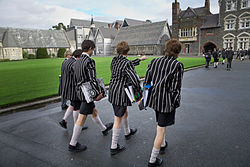
Traditionally, many New Zealand intermediate and high schools, and state-integrated and private primary schools, have followed the British system of school uniforms,[228] although it is common in state schools for the boy's uniform to have a jersey and grey short trousers rather than a blazer with tie and long trousers. This usually consists of a variety of the following apparel: for boys, a business-style shirt with an official school tie, and long or short trousers; and for girls, a blouse, and a plain and/or plaid (usually tartan) skirt, and in some schools, especially in the South Island, kilts. Both sexes wear an 'official' school jersey. Blazers and jackets are of varied colours according to the school - dark or light blue, grey, crimson, scarlet, green or black. Some follow the British practice of having contrasting colours edging the lapels and jacket fronts. Caps have generally been discarded since the 1970s but in many primary schools there is a compulsory broad-brimmed floppy hat, in the school colours, to help prevent sunburn. Where short trousers are worn, boys are usually required to wear long socks, and garters are compulsory in many schools to hold socks up.[229] Since 1990 an increasing number of schools, especially in the North Island, include sandals as the standard summer footwear. Many schools also allow students to attend barefoot, with a relatively large number of students choosing to do so.
During the 1980s and 1990s there was a tendency for the traditional uniform to be replaced by cheaper and more 'modern' options: polo shirts,[230] polar fleece tops, or a complete doing away with uniforms in favour of mufti. Intermediate schools usually provide the option of skirts or culottes for girls and sometimes shorts while boys will wear shorts. Bike shorts or tights are sometimes worn under girls' skirts and dresses.[citation needed] Some high schools have introduced trousers as an option for girls instead of skirts, however demand is low with several Christchurch high schools estimating only 1% of girls at their respective schools wear trousers.[231]
Tokelau
[edit]All three schools in Tokelau enforce uniform policies.[232][233][234]
Nicaragua
[edit]On 18 September 1979, an administrative decree introduced a mandatory uniform of white shirts and blue pants or skirts in all Nicaraguan public and private schools.[235]
Niger
[edit]Uniforms are worn widely in Nigerien schools.[236]
Nigeria
[edit]School uniforms are used in Nigeria for all public and private schools from nursery school through primary and secondary school. This originally came with the introduction of western education by Christian missionaries and the tradition continued during the colonial era up till the current era of independence. Some schools have so-called mufti days where this requirement is voided.
Niue
[edit]Niue's sole primary and secondary schools both require uniforms.[237][238]
North Korea
[edit]All North Korean students in schools are required to wear uniforms. Makeup is prohibited until graduation from high school.[239] Dress codes in universities vary with some requiring uniforms and others requiring formal wear.
Norway
[edit]School uniforms are generally absent from the Norwegian education system, except in certain international schools.[240][241]
North Macedonia
[edit]In September 2014, school uniform was made compulsory for all elementary students in the Municipality of Aerodrom in Skopje.[242] Several secondary schools in Skopje also enforce uniform policies.[243]
Oman
[edit]In March 2019, the Ministry of Education announced Omani public school students would be required to wear dishdashas for the 2019/2020 academic year.[244]
Pakistan
[edit]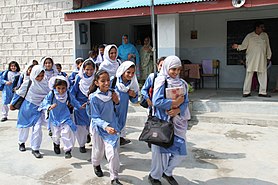
The school uniforms are compulsory in most schools in Pakistan. Both the public and the private schools have mandated uniforms. Boys uniforms are often made of a light-coloured shirt, long trousers usually brown or blue. The girls often wear Shalwar Qameez suit or in some schools shirt and skirt.
Palau
[edit]School uniform is compulsory for Palauan schoolchildren.[245]
Papua New Guinea
[edit]Papua New Guinean schools generally require uniforms.[246]
Palestine
[edit]Palestinian schoolchildren are required to wear uniform.[247]
Gaza Strip
[edit]Since 2009, the Hamas administration in the Gaza Strip has periodically pressured girls' secondary schools to adopt more conservative uniform policies, such as requiring students to cover their hair.[248][249][250][251]
Panama
[edit]School uniform is mandatory in Panamanian schools. A Ministry of Education decree temporarily relaxing these rules for the 2022 academic year caused controversy, with parents fearing it would lead to a rise in bullying.[252][253]
Paraguay
[edit]Uniforms were introduced in Paraguayan schools at the end of the 19th century and have been worn ever since.[254][255]
Peru
[edit]School uniforms are used in Peru. Almost all private schools, especially the British ones, use school uniforms.[citation needed]
Philippines
[edit]This section is missing information about year school uniforms were introduced to the Philippines.. (June 2023) |

School uniforms (Filipino: uniporme or kasuotang pampáaralán, "school attire"), are commonplace in public schools and required in private schools. Some private schools allow civilian clothing on special days, typically parties, school holidays or last day of school before a break. There is usually no uniform in universities and progressive schools, except for official athletic wear in physical education classes, and in specific schools such as the University of Santo Tomas.
Schools usually have two sets of uniform, a regular uniform and a physical education (PE) uniform, the latter worn once a week (usually Fridays):
- Regular uniform
- Boys
- Plain white or collared polo shirt with chest pocket, usually short-sleeved with school insignia. Some private schools may add a necktie, and use a long-sleeved shirt over a vest or blazer.
- Pants or shorts (usually black, navy blue or khaki). Shorts usually worn up to elementary level.
- White or black socks, and black leather shoes
- Girls
- Short-sleeved collared blouse (usually with sailor or Peter Pan collar), usually with necktie or ribbon matching the colours of the skirt, or worn with jumper dress or blazer
- Plain or plaid skirt, usually pleated and covers the knees
- Plain or plaid jumper dress, usually pleated and covers the knees (some schools)
- Collared dress with necktie or ribbon (some schools)
- White socks and black shoes (preferably Mary Janes or ballet flats)
- Boys
- Physical education uniform (unisex)
- T-shirt with school seal, crest or logo
- Sweatpants ("jogging pants"), usually in primary school colour
- Sneakers (usually white)
Muslim girls in some higher institutions are often required to wear a white hijab, and may be allowed much longer skirts than Christian girls.
Elementary and high school students at both private and public schools also wear Scouting uniforms at least once a week (usually Thursdays). Boy Scouts wear a Boy Scout T-shirt or khaki Boy Scout polo shirt and khaki pants or shorts, black leather shoes and socks, and a neckerchief with carabao fastener (colour depends on age level). The baseball cap is optional. Girl Scouts wear a Girl Scout T-shirt and dark green shorts (usually for Twinkler and Star Scouts) or a dark green collared knee-length Girl Scout dress, worn with black shoes and white socks, a yellow neckerchief and fastener and an optional green baseball hat.
Members of secondary school CAT cadet units and ROTC units of the National Service Training Program in institutions of higher education wear as a general rule military style attire depending on circumstances (The other two tracks of the NSTP are not required to wear such uniforms).
The material for these usually loose uniforms are often light and suited to the country's tropical climate (e.g. cotton).
In 2008, the Department of Education ordered that students are no longer required to wear uniforms. This was to enable poorer families to save money for basic needs.[256]
Poland
[edit]School uniforms are not compulsory in Poland and absent from the vast majority of Polish schools. In the People's Republic of Poland, uniform ceased to be compulsory in most schools during the 1980s due to economic issues. Since then, there has been made only one effort to reintroduce uniform into Polish schools - by the former minister of education Roman Giertych, in 2006. It was then decided that school uniform would not be enforced by the state onto the whole country, but would be a matter decided upon by the principal of each school respectively. Initially this was meant to permit only a dress code, but this was later modified in 2007 to address school uniform. From 2007, all primary schools and middle schools were to enforce compulsory uniform, whilst high schools and other forms of further education were given the choice to decide on their own. The appearance of school uniform was decided upon locally, which meant that "uniform" in most schools consisted of a jacket or shirt only - selected by the school management purely to avoid breaking regulations (the rest of clothing was still up to the students to decide). By mid-2008, compulsory school uniforms were repealed and it remains so to this day.
Portugal
[edit]Students are required to wear uniforms at most Portuguese private schools, especially those in Lisbon and Porto. Use in state schools is rare.[257]
Qatar
[edit]Qatari public and private schools require students to wear uniform.[258][259]
Romania
[edit]School uniforms were introduced to Romania in 1897 by academician Theodor Costescu when they worn by students in Turnu Severin. Its use broadened in tandem with Spiru Haret's educational reforms in the 1900s. Uniforms fell out of favour somewhat in the 1990s due to their association with the Socialist Republic of Romania.[260][261] In August 2022, Minister of Education Sorin Cîmpeanu spoke in favour of making school uniform mandatory in Romanian schools.[262]
Russia
[edit]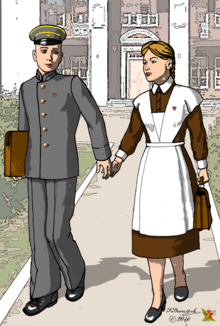
In 1834, Nicholas I introduced a mandatory uniform for gymnasium students in the Russian Empire. Following the 1917 Russian Revolution, their use ceased until 1949, when a standardised "universal" uniform began to be worn in all schools.[263]
Originally consisting of a military style with peaked cap and high collared tunic, by the 1980s boys wore a functional dark blue pattern with shoulder patches. For formal occasions such as the first day of term, girls wore white lace collars and aprons dating back to the reign of Catherine the Great. During the initial-post Soviet period from 1994 to 2013, the mandatory uniform policy was abandoned and pupils generally wore casual clothing such as jeans, T-shirts and sweaters. However, uniforms were reintroduced under a new education law in September 2013.[264] Among the supporters of the new uniform law of 2013, arguments included tackling social inequality, but also putting an end to the controversial problem of whether school students are allowed to wear traditional religious clothing to school.[265]
Each school can now choose its own uniform.[264] Also, there are many instances in which schools do not enforce the rules on school uniform. Generally, schools without school uniforms enforce dress-code, with "business-casual" style of clothes.
Rwanda
[edit]Most Rwandan schools enforce uniform policies. In general, girls are made to wear skirts and dresses while boys wear shorts or trousers.[266]
Saint Helena, Ascension and Tristan da Cunha
[edit]Saint Helena
[edit]Prince Andrew School, Saint Helena's sole secondary school, requires students to wear uniform.[267]
Ascension Island
[edit]Two Boats School, Ascension Island's only school, requires students to wear uniform.[268]
Tristan da Cunha
[edit]St. Mary's School, Tristan da Cunha's only school, does not require students to wear uniform.
Saint Kitts and Nevis
[edit]School uniform is mandatory in Kittian and Nevisian schools. The government operates a School Uniform Assistance Programme to help citizens meet the associated costs.[269]
Saint Lucia
[edit]School uniforms are worn in Saint Lucian schools.[270]
Saint Vincent and the Grenadines
[edit]Vincentian schools enforce strict uniform policies.[271][272]
Samoa
[edit]School uniforms are mandatory in Samoan schools.[273]
São Tomé and Príncipe
[edit]São Toméan schools require students to wear uniforms.[274]
Saudi Arabia
[edit]In August 2015, ahead of the 2015-16 academic year, new standardised uniforms were introduced for all girls studying in Saudi public schools, Quran memorization schools and schools for illiterate adult women.[275] In most schools, boys wear a thobe, and girls wear a maryoul or a skirt with a shirt .
Serbia
[edit]In the Socialist Federal Republic of Yugoslavia, some schools enforced a mandatory uniform consisting of a navy blue "apron" (Serbian: кецеља kècelja).[39] In 2016, Minister of Education Mladen Šarčević called for the introduction of uniforms in Serbian schools.[276]
In September 2017, at least 100 primary schools had adopted school uniforms.[277] Since then, the municipality of Medijana has annually provided cohorts of new primary school students with uniforms at the start of the academic year.[278][279]
Senegal
[edit]In 2021, the Senegalese government announced plans to generalise the wearing of compulsory school uniforms in all public and private schools by 2023.[280]
Seychelles
[edit]Uniforms are compulsory in Seychellois schools.
In January 2006, Director General of Schools Jeanne Simeon announced standardised uniforms for primary schools based on region, with each having its own uniform colour:
- North (Anse Etoile, Beau Vallon, Bel Ombre, Glacis and La Retraite): Big and small blue-green stripes
- East (Anse Royale, Anse Aux Pins, Cascade and Takamaka): Red stripes
- Central (Bel Eau, Mont Fleuri, La Rosière and Plaisance): Red with small squares
- West (Anse Boileau, Baie Lazare, Grand Anse Mahe and Port Glaud): Blue stripes
- Inner Islands (Baie Ste Anne, Grand Anse Praslin, La Digue and Silhouette): Small dark-green squares
All secondary school students wear white poplin blouses and shirts. Boys in all schools wear khaki pants while girls wear blue skirts.[281]
Sierra Leone
[edit]Uniforms are prevalent in Sierra Leonean schools. At present, most uniforms are made from poplin or cotton, although there are a few private primary schools that use locally-produced gara tie-dyed cloth.[282]
Sint Maarten
[edit]School uniforms are compulsory in Sint Maarten schools.[283]
Slovakia
[edit]In Slovakia, use of school uniforms is confined to private and international schools.[284]
Slovenia
[edit]In the Socialist Republic of Slovenia, schoolchildren were obliged to wear the red-starred blue cap and red scarf of the Union of Pioneers of Yugoslavia. Since 1991, use of school uniform in Slovenia has been limited to private institutions, such as British International School of Ljubljana.[285]
Solomon Islands
[edit]Solomon Islander schoolchildren wear uniforms.[286]
Somalia
[edit]In the Somali Democratic Republic era, uniforms were worn widely in Somali schools.[287]
Somaliland
[edit]In the autonomous Republic of Somaliland, school uniforms are mandatory.[288]
South Africa
[edit]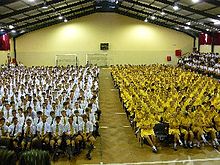

As in many other former British colonies, most South African private and public schools have a uniform, and it is compulsory in all public schools and in the vast majority of private schools for children above pre-school level.[289] Uniform types vary less between public and private schools than they do across regions, where schools in more rural areas tend to forgo the daily wearing of ties and/or blazers for boys and girls regardless of their public or private nature. However, many of these same schools will have a "number ones" uniform for special occasions that include such items. In cities such as Cape Town, on the other hand, it is more common to see formal apparel required in public and private schools on a daily basis.
Many schools across South Africa also provide the choice between a summer and winter uniform, with khaki uniforms and brown shoes being very common in the summer. Although many schools allow girls to also wear trousers (especially during winter months) South African law has not required gender neutrality in school dress codes and a distinction between girls' and boys' uniforms remains. Boys of all ages are normally required to wear grey or khaki long or short trousers with socks, and the socks are usually long when worn with shorts, as in the illustration (right). Until recently, the straw boater was a common accessory in affluent public and private high schools, although these have now become optional in some cases.[290]
Nearly all schools, public or fee paying, have sports' kits (uniforms) that often allow bare feet for junior schools, regardless of the season.
South Korea
[edit]
Almost all South Korean secondary students wear a uniform called "gyobok" (Korean: 교복, 校服). The majority of elementary schools, except some private ones, do not have uniforms; however, the uniform is strictly monitored from the start of middle school and up. Based on Western-style ones, the South Korean uniform usually consists of a shirt, blazer and tie, with skirts for girls and trousers for boys.
More recently, the uniform is often worn by celebrities who target the younger, teen audience to sell entertainment products. The school uniform and school setting is frequently used as a venue for romance. As a result, the uniform has become something akin to an expression of fashion among students.
Name tags that are worn usually have different colours per grade. Oftentimes the writing is in black or white, whereas the background is coloured.
South Sudan
[edit]Students are required to wear uniforms in many schools across South Sudan.[291]
Spain
[edit]In Spain, the use of school uniforms is not compulsory in public schools at any specific point. Their usage is decided upon by school boards, with parents' thoughts and opinions taken into account. It is customary to wear uniforms in private schools, where typically girls wear shirts emblazoned with the school's emblem and a jersey skirt, while boys wear a white shirt and tie on top with trousers or shorts on bottom.[292]
Sri Lanka
[edit]It is mandatory for Sri Lankan school students to wear a uniform regardless of them attending a government, semi-government or private school. In most government and semi-government schools, boys will wear a short-sleeved white shirt and navy blue shorts when they are in the junior grades. This will later transition to white shorts and then to white trousers towards the latter part of the school life. A tie is not always worn, but may be worn for special school events along with a long-sleeved shirt. Proper black dress shoes and socks are also a part of this uniform. Certain schools also require the uniform to have the school's insignia stitched to a corner of the pocket of the shirt.
Girls who attend government and semi-government schools will wear a white one-piece dress. This may or may not have sleeves. Certain schools make wearing a tie mandatory for girls and some may have a plastic badge or the school's insignia stitched to the dress. Proper dress shoes and socks are mandatory in most schools.
On special occasions, students who bear a post in a sports team, club, or association would wear a blazer that would normally be white and having accents based on the school colours.
In privately run schools, the suit is very similar but the colours might differ. They range from khaki and dark green to bright blue.
Sudan
[edit]Sudanese schoolchildren are required to wear uniforms.[293]
Suriname
[edit]School uniform is compulsory in Surinamese schools.[294]
Sweden
[edit]Uniforms are exceptionally rare in Swedish schools, being limited to independent and international schools such as Sigtunaskolan Humanistiska Läroverket and the Nordic International School. In 2017, the Swedish Schools Inspectorate ruled students at Nordic International School's Norrköping campus could not be disciplined for not complying with the school's uniform policy.[295][296]
Switzerland
[edit]In Switzerland, use of school uniforms is limited to international and other private schools.[297]
Syria
[edit]Up until 2003, public school students in Ba'ath Party-governed Syria wore military khaki-coloured uniforms. In April 2003, the Ministry of Education announced plans to replace these with unified blue uniforms for all elementary students; pink and blue uniforms for intermediate schools students; and gray, blue and pink uniforms for secondary school students.[298] In September 2003, the new uniforms were implemented as planned.[299]
Taiwan
[edit]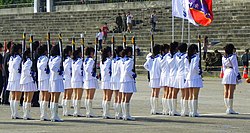
As Taiwan experienced a long period of Japanese colonial rule, it is influenced by Japanese culture and the uniform style can be said to be close. However the school uniforms in the two countries are not identical. Recently, school uniforms in Taiwan inspired from Catholic school uniforms that used in Western schools (e.g. shirt, blazer, tie, skirts/trousers)—For tie and skirts/trousers, they are available in plain/tartan patterns.
There are a total of 471 Taiwanese high schools. All schools have two sets of uniforms, a summer uniform and a uniform for winter. According to the provisions, sportswear is worn.
Summer
Elementary school (Chinese: 國小):White short trousers and shirts are most common for the boys, while girls will wear a pleated skirt
Junior high school (Chinese: 國中):Males wear short-sleeved shirts with shorts. Females wear shirts with pleated skirts or skirt trousers. Some schools have sailor uniforms.
Senior high school (Chinese: 高中):Short sleeved shirts with long trousers for males, pleated skirts for females in public schools; private schools will always have skirts
Winter
Long trousers and long sleeved shirts are worn in most schools.
In the past, many schools had khaki uniforms but this has been phased out with the exception of a few schools.
Tajikistan
[edit]School uniforms are worn in Tajikistani public schools.[300]
Tanzania
[edit]School uniforms are a mandatory requirement in Tanzanian schools.[301]
Thailand
[edit]-
 Works related to Student Uniform Act, BE 2551 (2008) at Wikisource
Works related to Student Uniform Act, BE 2551 (2008) at Wikisource
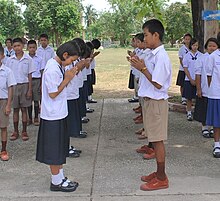
Uniforms are compulsory for all students with very few variations from the standard model throughout the public and private school systems, including colleges and universities.
The dress code in primary and secondary grades for boys comprises dark blue, khaki, or black shorts with a white open-collar short-sleeved shirt, white ankle socks or long dark socks, and brown or black trainers. Female students, wear a knee-length dark blue or black skirt, and a pale white blouse with a loosely hanging bow tie. The bow tie is dropped in favour of an open-necked pale blue shirt from Matthayom 4.
The girls' uniform is complemented by white ankle socks and black school shoes. The student's name, number, and name of the school are often embroidered on the blouse or shirt. Some independent or international schools have uniforms more closely resembling British school uniform standards, and boys in senior high school grades may be allowed to wear long trousers. The standard dress for children in kindergarten is a red skirt and white blouse for girls, and red short trousers and a white shirt for boys. In all Thai schools, one day per week, usually Wednesday, is dedicated to scouting, when beige scout uniforms for boys and dark green guide uniforms are the rule, both wearing yellow neckerchiefs.
The hairstyle of students is also given attention by schools and the Ministry of Education. Males are not allowed to have long hair. Some prohibit even girls from having long hair.[302][303] The use of accessories is prohibited for males, while females are sometimes allowed to use simple accessories. Some schools dictate the colour and type of hair accessories that females can use.
Thailand however has a few international schools that do not require uniforms.
Togo
[edit]Upon independence in 1960, Togolese public schools retained the mandatory khaki-coloured uniforms that were introduced during French colonial rule.[304][305]
Tonga
[edit]
In Tonga all schools require a uniform. Uniforms are usually in the colours of their respective churches and Red for Government Schools. Catholic schools are usually light blue, Wesleyan (Royal Blue), Anglican (Navy Blue) and LDS Schools (Green). A ta'ovala bordered with school colours and a tupenu are usually worn by boys with a white button-up shirt. Pupils usually wear shorts and a white button up shirt. Nearly all Tongan secondary schools require girls to wear a pinafore dress with a white shirt, except for Catholic schools, which allow a striped blouse and skirt. Pupils are usually required to wear Roman sandals in English-medium schools, and thongs (flip-flops) in most other schools.
Trinidad and Tobago
[edit]School uniforms are worn in all Trinidadian and Tobagonian public schools.[306][307]
Tunisia
[edit]As of 2017, Tunisian public high schools enforce dress codes which apply exclusively to female students, obliging them to wear long blue gilets.[308]
Turkey
[edit]
Up until 2012, school uniforms were used in all public and private institutions. There were several exceptions and most kindergartens did not require school uniforms. The uniforms varied in their appearance; primary schools used one-piece blue uniforms, while in secondary and high schools boys wore dark grey trousers with white shirts, jackets and a tie. Girls had skirts and shirts coloured like the boys' uniform, plus a tie. Most private institutions have their own uniforms. School uniforms for primary schools were black until the 1990s. None of the universities or higher-education institutes have uniforms.
School uniforms abolished in 2012 and schools gave a poll to families to select uniform or casual cloths. Dress code says that students' shoulder should be covered, girls cannot wear leggings or miniskirts. This caused a controversy in Western cities since some students were wearing miniskirts, shorts and leggings. New law says that students can wear hijabs at school but it's prohibited to wear makeup, tattoos, piercings, dyed hair, etc.[309]
School uniforms have a long history in Turkey. They were first introduced because normal clothing would give hints about the child's family's economic situation. In order to prevent groupings amongst children from different social classes, uniforms were accepted.
However, school uniforms were officially abolished on 27 November 2012, when the Turkish Ministry of Education suddenly abolished the nationwide uniform requirement in schools (international/foreign schools are excluded) and lifted the headscarf ban for religious imam-hatip schools, prompting fierce criticism from opposition parties, unions and educators. Opponents claim that economic differences cause pedagogical traumas for children and that permitting headscarves harms secular education. Prime Minister Recep Tayyip Erdoğan defended the move, saying education in uniform has drawn complaints for many years. But students attending minority schools (Greeks, Jews, and Armenians), which are also part of the Turkish Ministry of Education, have been excluded from this change, and are still required to wear school uniforms.[310]
On December 6, 2024, after 12 years, uniform dress code has been reinstated.[311]
Turkmenistan
[edit]Uniforms are compulsory in Turkmenstani schools. Girls’ uniforms are entirely based on national costumes. They include bright green, ankle-length dresses decorated with embroidery. Male and female students must wear takhyas. Girls sport two long braids, and those with short hair attach fake plaits to their takhyas to meet the requirements. The strict dress code was imposed under President Saparmurat Niyazov. The obligation to wear national costume is unpopular among some ethnically non-Turkmen students.[312]
Turks and Caicos Islands
[edit]School uniforms are worn by students at all levels throughout the Turks and Caicos Islands.[313][314]
Tuvalu
[edit]Section 10.2.1 of Tuvalu's National Education Policy obliges all children attending public schools to wear the approved national school uniform.[315]
Uganda
[edit]Most Ugandan public and private schools have uniforms from kindergarten through secondary school. These mostly range from dresses, skirts and blouses, pinafores, blazers, neckties for female students to shirts and trousers or shorts, blazers and neckties for male students. A few schools allow female students to wear pants. A few international schools do not enforce school uniforms.[316]
Ukraine
[edit]In June 2019, President Volodymyr Zelenskyy repealed a 1996 decree that had obliged Ukrainian secondary school students to wear compulsory uniforms.[317]
United Arab Emirates
[edit]Uniforms are compulsory in many schools across the United Arab Emirates.[318]
In June 2013, the Abu Dhabi Education Council standardised the uniforms for pupils in public schools across Abu Dhabi.[319] Uniforms include options for varying weather conditions. [1] Boys in Kindergarten and Cycle 1 (Grades 1 to 5) can wear either a long-sleeved shirt and trousers or a short-sleeved shirt and shorts. Tie, winter blazer, and cardigan are optional. Boys in Cycle 2 and Cycle 3 (Grades 6 to 12) wear a kandoora (traditional white robe) and ghetra (head scarf). Pullover sweater or blazer are optional Girls in Kindergarten or Cycle 1 (Grades 1 to 5) wear a long sleeved shirt with either a school dress or skirt. Cardigan, blazer, and scarf are optional. Girls in Cycle 2 or 3 (Grades 6 to 12) wear a long sleeved shirt with a choice of a skirt or two different styles of dress plus a scarf. Cardigan or blazer are optional. These are only for the schools with the Arabic curriculum, not the other schools.
Private schools in the UAE require a school uniform. It can range from a T-shirt or a simple white/black polo bearing the school logo to a more complete uniform with a button up shirt worn with a skirt, shorts or trousers. In the British schools, there is a blouse and either a skirt or trousers for the girls or a button up shirt with trousers. Shirts bear the school logo. Certain schools have certain codes on the use of makeup (some don't condone it at all) and the sporting of bracelets/jewellery.
United Kingdom
[edit]While school uniform is common in the United Kingdom, there is no legislation enforcing it in any of the three separate legal jurisdictions of England & Wales, Scotland, and Northern Ireland, and enforcement of school uniform policy and dress codes is generally for individual schools to determine.[320] However, schools do have to take into account equality legislation in dress policies to prevent discrimination on grounds such as age, sex, race, disability, religion or belief and sexual orientation.[321] School uniforms are required to tolerate religious freedoms, e.g. allowing male Sikhs to wear turbans and female Muslims to wear headscarves.[322]
England
[edit]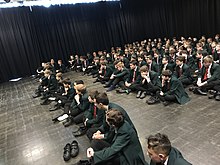
In 2011, more than 90% of English secondary schools had a compulsory uniform.[323] School uniforms were first introduced on a large scale[citation needed] during the reign of King Henry VIII.[324] The uniforms of the time were referred as "bluecoats", as they consisted of long trench-coat-style jackets dyed blue. Blue was the cheapest available. The first school to introduce this uniform was Christ's Hospital in London (now in Sussex).[325]
The Elementary Education Act 1870 introduced free primary education for all children. The popularity of uniforms increased, and eventually most schools had a uniform.[324] During this period most uniforms reflected the trends of the age, with boys wearing short trousers and blazers until roughly the age of puberty and then long trousers from about 14 or 15. Girls mainly wore blouses, tunic dress and pinafores.[324][326][327]
These uniforms continued until the 1950s when after the Butler reforms secondary education was made free and the school leaving age was raised to 15. These reforms encouraged schools to implement uniform codes that were similar to other schools. Distinct "summer" and "winter" uniforms were sometimes required, particularly for girls, for whom dresses were mandated for summer and gymslips for winter.[324]
In the 21st century, the typical primary school uniform is fairly casual while secondary school uniform is often formal. Uniform in primary school is generally a polo shirt or T-shirt, a jumper with the school logo, and trousers or shorts or a skirt. The typical secondary school uniform is a blazer, white shirt or blouse, a tie, trousers or skirt, and black shoes. Some primary schools have more formal uniform, with tie and blazer, and for secondary schools to require only a jumper. Uniforms sometimes match the school colours, but are most commonly found in blue, black and grey.
Scotland
[edit]
Scottish law is not specific on the question of school uniform. Generally, the school must provide information on its policy on clothing and uniform and the Education Authority must provide written information on its general policy on wearing school uniform. Some Education Authorities do not insist on students wearing a uniform as a precondition to attending and taking part in curricular activities.[328]
A child that simply refuses to wear the school uniform can be disciplined by the school if it thinks that academic or disciplinary problems might be caused by the refusal. Punishments include (but are not limited to), isolation, detention or parental contact. Many schools do have a policy covering the wearing of school clothing. The policy may state that certain items must be worn and that other items cannot be worn, for example, jeans. Schools must take religious and cultural requirements into account when drawing up a school uniform policy.[329]
Although the way that the uniforms are worn is usually not an issue, some state schools may have regulation on the subject (e.g. height of ties, whether the shirt is tucked in or not), the selection of clothes worn, whether they follow the policy, can be very strict. For example, in black and white uniform schools, wearing colours such as grey or wearing white shoes is forbidden. However, in schools that only use a basic uniform (e.g. jumper and trousers) the policy is often less strict.
Wales
[edit]The Welsh Assembly Government issued detailed guidance to governing bodies on uniform and appearance policies that begins by making explicit, "There is no education legislation specifically covering the wearing of school uniform or other aspects of appearance such as hair colour and style, and the wearing of jewellery and makeup. However, as part of its responsibility for the conduct of the school, a governing body can specify a uniform that pupils are required to wear and other rules relating to appearance."[330]
Northern Ireland
[edit]The most common secondary school uniform in Northern Ireland is a shirt, blazer and sweater with a tie and a skirt or trousers. The uniform (most likely the sweater and tie) may change after Year 12 (final year of compulsory education). The uniform in primary school is similar to those used in the Republic of Ireland.
United States
[edit]Most schools in the United States do not require uniforms. More traditional private schools and other specialized schools sometimes require an informal uniform, called a standardized dress code. Policy regarding school-appropriate dress, and the extent of enforcement, will vary by school and school district. Progressive private schools do not require school uniforms.
Advocacy for school uniforms increased in the 1990s after President Clinton advocated for them.[331]
A study conducted in 2000 found that only 23% of public, private, and sectarian schools had any sort of uniform policy in the United States at or before 2000.[332]
The schools that do require uniforms, or a more common standard dress code in inner city neighborhoods, tend to be more casual than those in Britain or other commonwealth nations. Commonly, students wear collared, buttoned shirts, with a tie for boys and a tie for girls, worn with khaki trousers, and a belt, depending on the age of the school's student body. Skirts of a modest length are occasionally an option for girls.
Mark Oppenheimer of The New Yorker characterized school uniforms as "relatively new" as they did not have an extensive history there compared to the United Kingdom.[331]
Dress codes vary widely among private schools, although a Catholic school uniform tends to keep the shirt and tie.[333]
The proportion of U.S. public schools requiring uniforms had increased from 3% in 1996 to 25% in 2010.[citation needed] As of 2016[update], 4% of the public schools with below 25% of the students being allowed to take free or reduced lunch had mandatory uniforms. 53% of the schools with 75% of the students being allowed to take free or reduced lunch had mandatory uniforms. Oppenheimer concluded, based on school uniforms being more common in schools with student bodies from low income backgrounds, that mandatory uniforms "have really become a feature of poor schools."[331] However in 2019 and 2020 due to the COVID 19 pandemic, many districts have removed, changed or relaxed their uniform policies.[334][335][336] Most schools with district wide policies rarely enforce the uniform. It is common to see students wearing non uniform clothes or hoodies over their uniform shirts. Many schools advertise that they require uniforms on their website however on their social media posts, many students are not wearing one.[citation needed]
Research studies and legislation
[edit]According to Oppenheimer, "When independent researchers have tried to quantify [claims that school uniforms are effective], they have had mixed results."[331]
The National Association of Elementary School Principals (NAESP) conducted a phone survey of 755 principals in 2000, which revealed that 21% of public schools had a uniform policy; 23% had firm plans to create one.[337]
Adolfo Santos, a political science professor at the University of Houston–Downtown, stated that many Hispanic communities in the United States choose uniforms because many immigrants originate from countries with schools requiring uniforms.[338]
Sylvan I. Alleyne, Velma LaPoint, Jennifer Lee and Harold W. Mitchell of The Journal of Negro Education stated that little empirical research exists regarding how effective school uniforms are in enhancing academic performance and social environments, and that little research exists regarding teachers' beliefs regarding issues related to dress codes, especially so regarding racial and ethnic minorities.[339] In the United States, literature regarding public school student clothing and behavior cites anecdotal viewpoints from teachers. The literature discussed opinions on faculty, staff, and other employees on how to deal with student dress issues.[340] A 2003 article of The Journal of Negro Education said that research and reports regarding the beneficial impact of school uniforms was not conclusive. Despite the federal government of the United States issuing a set of guidelines encouraging school uniforms in public schools, as of 2003 political support varied.[341]
In 1994, the Long Beach Unified School District, in Southern California, required school uniforms in all elementary and middle schools. However the district no longer requires uniforms anymore. This began a trend for uniforms in American elementary public schools, especially in urban school districts and in low income districts as well. President Clinton praised the idea in his 1996 State of the Union Address, saying that "if it means that teenagers will stop killing each other over designer jackets, then our public schools should be able to require their students to wear school uniforms."[2] Oppenheimer examined the study and argued that "the city had taken many other measures to reduce violence at the same time, so it’s hard to tease out how much uniforms mattered."[331]
American Samoa
[edit]All public school students in American Samoa wear school uniforms.[342]
Guam
[edit]Since 2008, Board Policy 401 has made school uniform mandatory in all Guam Department of Education public schools.[343]
Northern Mariana Islands
[edit]In 2009, Hopwood Middle School on Saipan introduced a mandatory school uniform, requiring students to wear blue or gold shirts.[344]
Puerto Rico
[edit]In Puerto Rico, the Department of Education requires all students to wear school uniforms, with only medical exemptions.[345]
US Virgin Islands
[edit]Schools on the United States Virgin Islands require uniforms.[346] Some schools require female students to wear skirts.[347]
Uruguay
[edit]
Uniforms are compulsory in all Uruguayan public schools.
The design has been the same since the 1900s, a white coat with a blue ribbon on the neck. It was implemented to promote social equity amongst students of different social backgrounds.
Uzbekistan
[edit]In August 2017, President Shavkat Mirziyoyev proposed the introduction of a standardized compulsory uniform across all Uzbek public primary and secondary schools.[348] In August 2018, the Cabinet of Ministers of the Republic of Uzbekistan formally adopted a resolution to enforce the new uniform policy beginning in the 2019/20 school year.[349] In July 2022, Minister of Public Education Baxtiyor Saidov announced the standardized uniform policy will be implemented gradually through 2025.[350]
Vanuatu
[edit]School uniforms are widely worn in Ni-Vanuatu schools.[351]
Vietnam
[edit]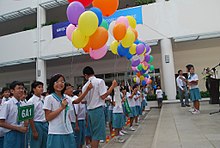
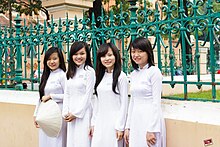
Most schools in Vietnam require uniforms. The rules on uniforms vary between schools and areas. The most common type of uniform consists of a white shirt with the school emblem on the left sleeve and navy/black trousers for boys or skirts for girls, with a red scarf for students from grade 3 to grade 9. Many schools (usually private or famous public schools) have their own designed uniforms, which often include bows, ties or vests/blazers.[352]
The white áo dài, representing the purity and innocence of youth, is used by high school girls in Vietnam, but nowadays, most schools only require it for important events or ceremonies, since wearing áo dài is uncomfortable for daily use. The image of a high school girl with nón lá and white áo dài on a bicycle is considered symbolic.
There are also uniforms for physical education in Vietnamese schools. This usually includes shirts and tracksuits. Both outfits have the school emblem on the chest. The tracksuits are popular in the north, where they are often worn in the winter, even outside of gym activity.
There are no specific shoes for Vietnamese students. However, flip-flops, slippers, and especially high heels are forbidden. Sandals and boots are allowed, although students normally wear sneakers or flats to school. Dyed hair, nail polish and make-up are explicitly banned in virtually all schools.
Venezuela
[edit]School uniforms are used in Venezuela.[353] By Venezuelan decree, uniforms are required at all schools in all grades.[354] Boys wear navy trousers and girls wear navy skirts or trousers, depending on the school. The shirts have short sleeves and the colour varies by the level in which the student is. Students in nursery wear yellow shirts, while students in kindergarten wear red shirts. From first to sixth grade, students wear white polo shirts. From seventh to ninth grade they wear light blue polo shirts, and from tenth to eleventh grade they wear beige polo shirts. These shirts are to be stuffed inside the trousers with a black belt. Black dress shoes are the norm in public school, however some private schools can be more flexible with the shoes to be worn.
Yemen
[edit]Uniforms are worn in Yemeni schools.[355]
Zambia
[edit]School uniforms are ubiquitous across Zambian government and private schools.[356]
Zimbabwe
[edit]School uniforms are worn in most Zimbabwean schools, but these policies are not legally mandated.[357]
See also
[edit]References
[edit]- ^ see Scott, Jenny (5 September 2014). "The history of school uniforms". BBC News.
- ^ Brunsma, David L. "A Brief History of School Uniforms and Dress Code". The School Uniform Movement and what it Tells Us about American Education. pp. 3 ff.
- ^ McCourt, Laura (4 January 2013). "School Uniform Policy in Scotland, England, Wales and the Republic of Ireland briefing paper 48/13" (PDF). Northern Ireland Assembly. Northern Ireland Assembly Research and Information Service. Retrieved 9 November 2015.
- ^ Agerholm, Harriet (21 March 2017). "Afghanistan scraps plans for new ultra-conservative girls' school uniform". The Independent. Retrieved 5 October 2021.
- ^ Cole, Diana (19 March 2017). "Afghan Women Say No To The Dress". National Public Radio. Retrieved 5 October 2021.
- ^ "Te gjithe nxenesit ne shkolle me uniforma". Top Channel (in Albanian). 18 September 2009. Retrieved 5 October 2021.
- ^ Hasnaoui, Karima. "Ecole, le port du tablier et sa couleur font polémique". Radio Algérienne (in French). Retrieved 14 June 2022.
- ^ "Communication". The British College of Andorra. Archived from the original on 21 September 2022. Retrieved 21 September 2022.
All students from Nursery to Year 11 are required to wear a uniform.
- ^ "How to prepare for back to school?". Agora Andorra International School. 3 September 2021. Archived from the original on 21 September 2022. Retrieved 21 September 2022.
- ^ Soares, Isaías (7 April 2015). "Conselho Consultivo reconhece necessidade de melhoria na qualidade de ensino". Novo Jornal (in Portuguese). Retrieved 16 September 2022.
- ^ "Preço das propinas está a ser analisado". Jornal de Angola (in Portuguese). 21 June 2013. Retrieved 16 September 2022.
- ^ "Statement on Textbooks, School Uniforms and School Supplies". The Anguillian. 9 September 2020. Retrieved 12 September 2022.
- ^ Lovell, Harold E. (23 January 2014). "Antigua and Barbuda 2014 Budget Statement". Government of Antigua and Barbuda. p. 129. Retrieved 28 August 2022.
The Government has spent about $25 million on the School Uniform Grant Programme since it started in 2004.
- ^ Rivero, Guadalupe (21 August 2019). "Hacia un uniforme sin género en las escuelas". Clarín (in Spanish). Retrieved 5 October 2021.
- ^ "Matilde Figueiras, la maestra que impuso el guardapolvo blanco en las escuelas". abc.gob.ar (in Spanish). 20 March 2019. Retrieved 5 October 2021.
- ^ Gielkens, Lobke. "Op Aruba gaat de schoolbel om 7u30! Jep, dat is dus al om half 8 's ochtends!". Maison Slash (in Dutch). Retrieved 12 September 2022.
- ^ "Leerlingenprotest tegen uniformregels op Aruba". Antilliaans Dagblad (in Dutch). 17 September 2021. Retrieved 12 September 2022.
- ^ "Colegio arubano past kledingregels aan". Antilliaans Dagblad (in Dutch). 23 November 2021. Retrieved 12 September 2022.
- ^ "Դպրոցական համազգեստ. հատո՞ւկ, թե՞ ըստ ճաշակի". a1plus.am (in Armenian). 11 August 2009. Retrieved 28 August 2022.
- ^ See e.g. School uniform price list making a distinction between summer uniform and winter uniform.
- ^ "Christmas Island District High School". goodschools.com.au. Retrieved 27 February 2023.
- ^ "Cocos Islands District High School". goodschools.com.au. Retrieved 27 February 2023.
- ^ "Norfolk Island Central School". goodschools.com.au. Retrieved 27 February 2023.
- ^ Midgley, Emma (30 March 2021). "Ten things you will notice as a parent with a child at school in Austria". thelocal.at. Retrieved 5 October 2021.
Children in Austria do not wear uniforms, pretty much any outfit goes at school...
- ^ "Yeni məktəbli forması: ekspertlər və valideynlər nədən narazıdır?". azedu.az (in Azerbaijani). 26 July 2022. Retrieved 28 August 2022.
- ^ Lee, David (11 September 2014). "Back to School Bahamas". hgchristie.com. Retrieved 28 August 2022.
- ^ Toumi, Habib (23 January 2011). "Bahrain school boys to wear uniforms from next year". Gulf News. Retrieved 13 September 2022.
- ^ "School uniforms required for new term". NationNews. 19 August 2020. Retrieved 28 August 2022.
- ^ "Единая школьная форма, недоборы в вузы и миграция абитуриентов - все фейки развеял министр образования". Belarus-1 (in Belarusian). 3 August 2022. Retrieved 16 September 2022.
- ^ "40 thousand school students in Minsk will wear a unified school uniform". Motolko.Help. 27 February 2024. Retrieved 7 September 2024.
- ^ Marie (1 September 2019). "Rentrée scolaire : L'uniforme revient à la mode". Metro (in French). Retrieved 16 September 2022.
- ^ ""Bout time parents get a break!"". Amandala. 14 August 2015. Retrieved 30 April 2022.
- ^ "More hands on deck for school uniforms". Amandala. 26 August 2014. Retrieved 30 April 2022.
- ^ Amoussou, Cedric (21 June 2018). "Enseignement secondaire au Bénin : L'uniforme Kaki désormais exigé pour les établissements privés (note)". La Nouvelle Tribune (in French). Retrieved 27 August 2022.
- ^ Hendrickson, Sékou (25 August 2021). "School uniform campaign launched with $80,000 target". The Royal Gazette. Retrieved 13 September 2022.
- ^ Wongmo, Chimi (12 August 2021). "4 reasons that make Bhutanese school life unique". Daily Bhutan. Retrieved 14 June 2022.
- ^ "Bolivia". AFS Intercultural Programs. 22 January 2015. Retrieved 26 February 2023.
You will probably wear a school uniform...
- ^ Manzaneda, Laura (27 January 2017). "Recuerdan que uniforme escolar no es obligatorio". Los Tiempos (in Spanish). Retrieved 4 October 2021.
- ^ a b c Apostolovski, Aleksandar (26 February 2017). "Униформисана носталгија". Politika (in Serbian). Retrieved 21 September 2022.
- ^ Vasić, Bojana (5 February 2013). "Uniformama protiv podjela". Nezavisne novine (in Serbian). Retrieved 21 September 2022.
- ^ "Botswana bans school uniform imports". Panafrican News Agency. 13 October 2021. Retrieved 14 June 2022.
- ^ Molelo, Laone (22 January 2022). "Gov't ban on importation of school uniform boost local tailors". Sunday Standard. Retrieved 14 June 2022.
- ^ Costa, Marina Morena (10 March 2011). "Um em cada quatro alunos de escola estadual recebe uniforme". Último Segundo (in Brazilian Portuguese). Retrieved 5 January 2020.
- ^ "'Respect your uniform' – VISTS Students urged". Virgin Islands News Online. 22 October 2014. Retrieved 13 September 2022.
- ^ "Orientation Begins on August 30th, Strict Uniform Policy in Place As Elmore Stoutt High School Reopens for Face to Face Sessions on Sept 6". 284MEDIA. 18 August 2021. Retrieved 13 September 2022.
- ^ Ghani, Saerah Haji Abdul (6 January 2018). "Perbadanan TAIB hulur sumbangan peralatan sekolah". BruDirect.com (in Malay). Retrieved 28 August 2022.
- ^ "Трябва ли да се въведе училищната униформа в училище?". Elhovo (in Bulgarian). 5 October 2016. Retrieved 16 September 2022.
- ^ Sangare, Ami (4 October 2012). "Port obligatoire de l'uniforme scolaire : les élèves se prononcent !". Burkina24.Com - Actualité du Burkina Faso 24H/24 (in French). Retrieved 16 September 2022.
- ^ "Bildungschancen für Straßenkinder in Burundi". Retrieved 18 March 2016.
- ^ "IIEP UNESCO" (PDF). Retrieved 18 March 2017.
- ^ "School Uniform and Little Sun". Retrieved 18 March 2017.
- ^ "- The Cambodia Charitable Trust". The Cambodia Charitable Trust. 13 August 2012. Retrieved 18 March 2017.
- ^ Malloum, Amina (29 August 2019). "Rentrée scolaire 2019: l'uniforme, tout un symbole". Cameroon Radio Television (in French). Retrieved 7 September 2022.
- ^ "L'Uniforme à l'école publique". 17 June 2009.
- ^ Champagne, Sara (25 January 2016). "L'Uniforme obligatoire en voie de devenir la norme dans les écoles publiques". La Presse.
- ^ "Beaconsfield High School implements mandatory dresswear - Montreal | Globalnews.ca".
- ^ "John Rennie High School will wear uniforms — but not everyone is on board - Montreal | Globalnews.ca".
- ^ "Owen Sound Sun Times". Archived from the original on 7 November 2017.
- ^ "Dress Code in TCDSB Schools". TCDSB. Retrieved 30 March 2015.
- ^ "SEE preside acto de entrega de materiais escolares e uniformes à Associação Black Panthers". Government of Cape Verde (in Portuguese). 18 September 2009. Retrieved 16 September 2022.
- ^ Boxall, Joanna (1 November 2021). "School Uniforms". Cayman Resident. Retrieved 13 September 2022.
- ^ "Bokassa Successor Says Dictator Killed Children in April Massacre". The New York Times. 24 September 1979. Retrieved 16 September 2022.
- ^ "Bokassa Doomed by Bangui Court". The New York Times. 13 June 1987. Retrieved 16 September 2022.
- ^ Soupou, Jeremiah (3 October 2006). "Pour ou contre l'uniforme scolaire ?". Agence Centrafricaine de Presse (in French). Retrieved 16 September 2022.
- ^ Serge, Djimhodoum (24 February 2020). "Société : slim, juste corps… quand la mode impacte la tenue scolaire". Tchadinfos.com (in French). Retrieved 16 September 2022.
- ^ a b "Wearing a bit of history". South China Morning Post. 29 November 2011. Retrieved 10 December 2018.
- ^ Lam, Sophia (16 March 2018). "A tale of two cities in uniforms: the story behind green school ties, tartan skirts and blue cheongsams". South China Morning Post. Retrieved 10 December 2018.
- ^ Wordie, Jason (5 May 2017). "Hong Kong's school-uniform culture: a history of conformity". South China Morning Post. Retrieved 10 December 2018.
- ^ "澳门校服 :整洁规范展少年风采,百年坚守育爱国情怀". Sohu.com (in Chinese). 20 December 2020. Retrieved 4 March 2023.
- ^ "Colegios oficiales de Rionegro no usaran más uniforme de gala". RCN Radio (in Spanish). 19 May 2016. Retrieved 5 September 2024.
- ^ Ibrahim, Mounawar (21 September 2019). "La rentrée scolaire : Les préoccupations des parents". Masiwa Komori (in French). Retrieved 21 September 2022.
- ^ Wabeno, Mechak (5 October 2021). "Rentrée scolaire : Certaines écoles conditionnent aux parents l'achat des uniformes et autres fournitures au sein de leurs établissements". Interkinois (in French). Retrieved 16 September 2022.
- ^ Martial, Loïcia (4 October 2016). "Congo-Brazzaville: le même uniforme scolaire pour tous". Radio France Internationale (in French). Retrieved 16 September 2022.
- ^ "School uniform sales thriving". Cook Islands News. 26 January 2011. Retrieved 16 September 2022.
- ^ Jiménez Segura, Natalia (18 January 2022). "Uniforme completo será obligatorio para curso lectivo 2022". teletica.com (in Spanish). Retrieved 30 April 2022.
- ^ "Osnovna škola Lotrščak - Odjeća". rino-institut.hr (in Croatian). 6 July 2021. Archived from the original on 16 September 2022. Retrieved 16 September 2022.
- ^ "Osnovna škola Ružičnjak - Školska uniforma". rino-institut.hr (in Croatian). 12 July 2021. Archived from the original on 16 September 2022. Retrieved 16 September 2022.
- ^ Ramirez Alvarez, Osmel (3 September 2019). "School Uniforms Are an Important Issue in Cuba". Havana Times. Retrieved 12 September 2022.
- ^ "Geen schooluniform vanwege hitte". curacao.nu (in Dutch). 17 September 2017. Retrieved 12 September 2022.
- ^ Kyvidiotis, Michalis (20 August 2019). "Πόσα θα σας στοιχίσει ο σχολικός εξοπλισμός του παιδιού σας (ΕΡΕΥΝΑ)". alphanews.live (in Greek). Retrieved 13 September 2022.
- ^ "Το δικαίωμα στο 2020 ζητούν οι οργανωμένοι μαθητές της Κύπρου". avant-garde.com.cy (in Greek). Retrieved 13 September 2022.
- ^ Holcová, Renáta (2 October 2018). "Měla By Česká Republika Zavést Školní Uniformy?". Moda.cz (in Czech). Retrieved 16 September 2022.
- ^ Cope, Rebecca (12 August 2021). "Denmark's Prince Christian poses with his parents on first day at prestigious boarding school". Tatler. Retrieved 21 September 2022.
- ^ "Le Port de L'Uniforme À La Rentrée 2020/2021". Cripen (in French). Retrieved 16 September 2022.
- ^ "Government continues to defend mandated uniforms for online classes". Dominica News Online. 10 September 2021. Retrieved 13 September 2022.
- ^ Tavares, Juan Tomás (8 July 2019). "El lío de faldas en escuelas". Acento (in Spanish). Retrieved 30 April 2022.
- ^ Morel, María Teresa (3 November 2017). "Adiós a la camisa azul del uniforme escolar en el sector público". El Caribe (in Spanish). Retrieved 30 April 2022.
- ^ Batista, Lisania (3 November 2017). "El nuevo uniforme escolar dominicano costará más de RD$ 639 millones". Diario Libre (in Spanish). Retrieved 30 April 2022.
- ^ Luna, Katheryn (2 November 2017). "Ministerio de Educación cambiará el color de uniformes por región". Listin Diario (in Spanish). Retrieved 30 April 2022.
- ^ Supit, Trina (2021). Rebuilding the education sector in East Timor during UNTAET : international collaboration and Timorese agency. New York, NY: Routledge. ISBN 978-1000203219.
Compulsory school uniforms were a burden to poor parents.
- ^ Fointuna, Yemris (1 April 2002). "Timor still applies RI education system". Jakarta Post. Retrieved 13 September 2022.
- ^ "ACUERDO Nro. MINEDUC-MINEDUC-2018-00034-A" (PDF). Ministerio de Educación de Ecuador (in Spanish). Retrieved 4 October 2021.
En las instituciones educativas públicas, municipales, fiscomisionales y particulares, el uso del uniforme escolar será obligatorio...
- ^ "Ya no es obligatorio el uso de faldas como uniforme escolar en Ecuador". El Universo (in Spanish). 6 April 2018. Retrieved 4 October 2021.
- ^ El Metwally, Marwa (29 August 2019). "تاريخ الزي المدرسي الموحد.. بدأ في القرن الـ16 ونقلته بريطانيا لمستعمراتها". Al Bawaba (in Arabic). Retrieved 5 September 2022.
- ^ Ibrahim, Aya (21 August 2022). ""ابنك هيلبس إيه في المدرسة".. ألوان مبهجة للزي المدرسي للطلاب بالعام الجديد". Egypt Independent (in Arabic). Retrieved 5 September 2022.
- ^ "Equatorial Guinea Focuses on Improvements In Education". PR Newswire (Press release). Retrieved 16 September 2022.
- ^ "Trustee Visit to Eritrea 2016". John Holmes Trust. Retrieved 16 September 2022.
- ^ Himma, Marju (25 November 2019). "Kust sai alguse koolivormi kandmise traditsioon?". Eesti Rahvusringhääling (in Estonian). Retrieved 9 September 2022.
- ^ Kond, Ragnar (3 April 2014). "Valga põhikool sai endale logo, lipu ja koolivormi". Eesti Rahvusringhääling (in Estonian). Retrieved 9 September 2022.
- ^ Rudi, Hanneli (1 September 2011). "Koolivorm muutub Eestis aina populaarsemaks". Postimees (in Estonian). Retrieved 9 September 2022.
- ^ "School Uniforms Sewing project in Eswatini". designinghope.org. Retrieved 27 February 2023.
- ^ Wallace, Steve (7 September 2000). "New Swaziland Dress Code For Schools". Truth Magazine. 44 (17): 7. Retrieved 16 September 2022.
- ^ "Swaziland schools to ban mini-skirts". BBC News. 19 July 2000. Retrieved 16 September 2022.
- ^ "Addis Ababa to provide free uniform to 600,000 students". New Business Ethiopia. 12 August 2019. Retrieved 16 September 2022.
- ^ Prakash, Praneeta (13 December 2021). "School uniforms not compulsory". FBC News. Retrieved 6 September 2022.
- ^ "Koulupuku luo tasa-arvoa". Helsingin Sanomat (in Finnish). 25 January 2021. Retrieved 21 September 2022.
- ^ "Usein kysyttyä". Opetushallitus (in Finnish). Retrieved 21 September 2022.
Tästä syystä oppilaita ei myöskään voida velvoittaa käyttämään koulupukuja.
- ^ "Darcos ressort l'uniforme du placard". Retrieved 18 March 2017.
- ^ "France to introduce school uniforms in bid to reduce bullying and inequality". 8 January 2024.
- ^ Willsher, Kim (26 February 2024). "School uniforms return to French town in pilot scheme to tackle inequality". The Guardian.
- ^ "Macron's plan to move right: School uniforms, national service and more babies". 17 January 2024.
- ^ Kuhn, Amandine (22 January 2019). "Amandine, professeure de SVT en Guyane, témoigne". Notre métier SE-Unsa (in French). Retrieved 12 September 2022.
D'ailleurs en Guyane, l'uniforme scolaire est obligatoire : T-shirt basique de couleur uniforme (jaune chez nous) avec un pantalon bleu.
- ^ Viatge, Jean-Pierre (22 June 2012). "Collège de Tipaerui : l'uniforme scolaire en question". Tahiti Infos, les Informations de Tahiti (in French). Retrieved 4 October 2021.
- ^ Viatge, Jean-Pierre (9 October 2012). "Uniformes scolaires : la circulaire ministérielle invalidée". Tahiti Infos (in French). Retrieved 4 October 2021.
- ^ Loubet, Mireille (12 August 2015). "Les uniformes dans les collèges n'ont plus la cote". Tahiti Infos (in French). Retrieved 4 October 2021.
- ^ Kandassamy, Coraline; Mimifir, Claudia (5 September 2013). "L'uniforme scolaire : une " mode " qui fait fureur". France-Antilles.fr (in French). Retrieved 12 September 2022.
- ^ Lamy, Rodolphe (22 September 2014). "Uniformes scolaires : un marché en ébullition". martinique.franceantilles.fr (in French). Retrieved 4 October 2021.
- ^ Goapana, Nadine (4 May 2016). "La tenue uniforme généralisée dès 2017 en Province Sud". Nouvelle-Calédonie la 1ère (in French). Retrieved 12 September 2022.
- ^ "Faut-il rétablir l'uniforme scolaire ?". LINFO.RE (in French). 5 September 2012. Retrieved 12 September 2022.
- ^ "Au Collêge Mireille-Choisy: "Sans Tèléphone, On Serait des Intellos!"". Le Journal de Saint-Barth (in French). 14 December 2017. Retrieved 12 September 2022.
- ^ Rosaz, Karim (4 September 2016). "La rentrée scolaire se poursuit". Le Pélican (in French). Retrieved 12 September 2022.
- ^ Fontan, Fanny (10 September 2018). "Elèves, parents et enseignants réclament le report de la rentrée". Soualiga Post (in French). Retrieved 12 September 2022.
- ^ Dzonteu, Désiré-Clitandre (3 October 2012). "Décence et fantaisies des uniformes scolaires". Gabon Review (in French). Retrieved 16 September 2022.
- ^ Little, Mark (21 December 2020). "Why uniforms matter for schooling in Gambia, and how Rotary is happy to help". Rotary International in Great Britain & Ireland. Retrieved 16 September 2022.
- ^ M. Freyer. "Geschichte der Schulkleidung". In H. Liedtke (ed.). Handbuch der Geschichte des Bayerischen Bildungswesens. Vol. 4. pp. 273 ff.
- ^ a b "School uniform row grips Germany". BBC News. 9 May 2006. Retrieved 18 March 2017.
- ^ a b "In Germany, Veiled Students Stir Up Uniform Debate". Deutsche Welle. 8 May 2006. Retrieved 18 March 2017.
- ^ "Worksheets: My school is linked with Africa". CBBC Newsround. BBC. 19 July 2005.
- ^ Agebewode, Samuel (18 December 2010). "North Tongu District Distributes Free School Uniforms, Exercise Books to 40 Schools". The Ghanaian Chronicle. Accra.
- ^ "Nicholas's Story". NewsHour. PBS. 2001. Archived from the original on 14 November 2012. Retrieved 11 September 2017.
- ^ "GES introduces new school uniform for JHS students". Graphic Online. 11 April 2019. Archived from the original on 11 April 2019. Retrieved 9 June 2020.
- ^ "Here's the new school uniform for JHS students effective next academic year". 11 April 2019. Archived from the original on 12 April 2019. Retrieved 9 June 2020.
- ^ "მშობლები სკოლაში ფორმების დაბრუნებას ემხრობიან - რა უპირატესობა აქვს სასკოლო ფორმას?". mshoblebi.ge (in Georgian). 26 July 2015. Retrieved 13 September 2022.
- ^ "Σχολική "ποδιά" – στολή: τα υπέρ και τα κατά". Athens Voice (in Greek). 2 September 2018. Retrieved 13 September 2022.
- ^ "Administration of School Uniform Programme returned to schools". NOW Grenada. 22 July 2022. Retrieved 31 August 2022.
- ^ "Grenadian students benefit from school uniform voucher". Loop News. 4 September 2020. Retrieved 31 August 2022.
- ^ Rosales, Jose (9 January 2014). "Uniforme es una medida de control". Prensa Libre (in Spanish). Retrieved 30 April 2022.
- ^ "Guatemala: eliminan uso de uniforme a estudiantes de escuelas públicas". La Nación (in Spanish). 13 September 2008. Archived from the original on 30 April 2024. Retrieved 30 April 2022.
- ^ Conde, Aly Badara (2 September 2017). "Vente des tenues scolaires : Le ministre Konaté a-t-il dit la vérité sur les prix ?". guineelive.com (in French). Retrieved 31 August 2022.
- ^ Djemé, Carolina (20 October 2020). "Ano letivo 2020/2021: Associação de Alfaiates da Guiné-Bissau Apresenta Novos Uniformes Escolares". O Democrata (in Portuguese). Retrieved 31 August 2022.
- ^ "Uniforms: Identity, pride and discipline". Stabroek News. 20 July 2017. Retrieved 31 August 2022.
- ^ Smith, Jacob (3 February 2022). "Guyana Budget 2022: Govt hikes School Uniform and Cash grants for children". Writeups 24. Retrieved 31 August 2022.
- ^ "Retour Sur Nos Actions Éducatives en Haïti". Un Enfant par la Main (in French). 26 December 2019. Retrieved 1 May 2022.
- ^ "Congreso Nacional aprueba decreto para crear uniforme único en centros educativos públicos". Proceso Digital (in Spanish). 18 March 2014. Retrieved 30 April 2022.
- ^ "Mindenki utálta, hiánycikk lett, mégis kötelezővé tették - ez volt az iskolaköpeny". Origo (in Hungarian). 5 December 2021. Retrieved 15 September 2022.
- ^ "Skólabúningur í Borgarnesi". mbl.is (in Icelandic). 3 February 2006. Retrieved 4 March 2023.
- ^ "Uniforms & School Bags Distribution".
- ^ Media, Kompas Cyber (11 October 2022). "Aturan Baru Seragam Sekolah Siswa SD, SMP, SMA, Ada Pakaian Adat Halaman all". KOMPAS.com (in Indonesian). Retrieved 13 April 2023.
- ^ "Republic of Indonesia Ministry of Education: School Uniforms". Retrieved 18 March 2017.
- ^ "Peraturan Menteri Pendidikan dan Kebudayaan Nomor 45 Tahun 2014 Tentang Pakaian Seragam Sekolah Bagi Peserta Didik Jenjang Pendidikan Dasar dan Menengah". Peraturan.GO.ID (in Indonesian). Direktorat Jenderal Peraturan Perundang-Undangan Kementrian Hukum Republik Indonesia. 9 June 2014. Archived from the original on 5 July 2023. Retrieved 5 July 2023.
- ^ "Child-centred Schools".
- ^ "Department issues guidelines on wearing of uniforms for exams". The Irish Times. Retrieved 24 September 2017.
- ^ "Israel QA File news, Israel diplomatic map". Archived from the original on 3 April 2009.
- ^ Dr. Zvi Zameret, Fifty Years of Education in the State of Israel, Israeli Ministry of Foreign Affairs, 14 July 1998.
- ^ "la scuola dei grandi" Archived 2011-07-16 at the Wayback Machine.
- ^ "WWF: attenti ai tessuti di grembiuli e abitini per bambini" Archived 2006-08-21 at the Wayback Machine, VITA magazine, 13 September 2004.
- ^ "Students Protest as Italian Senate Passes Reforms". ABC News. New York. Associated Press. 29 October 2008.
- ^ "لباس فرم دانشآموزان اجباری نیست". The Islamic Republic News Agency (in Persian). Retrieved 13 September 2022.
- ^ "توضيح من وزارة التربية بشأن "الزي المدرسي"". Alnaeem News (in Arabic). 28 October 2021. Retrieved 31 August 2022.
- ^ "Côte d'Ivoire: Funding needed urgently as schools resume". ReliefWeb. OCHA. 6 October 2003. Retrieved 16 September 2022.
- ^ "Abidjan". ReliefWeb. OCHA. 27 January 2012. Retrieved 16 September 2022.
The recently made compulsory school uniform also represents a cost.
- ^ Korley, Martei (8 June 2017). "Jamaican School Days: New Providence Primary School". LargeUp.com. Retrieved 15 November 2024.
- ^ "School boards to decide specific uniform rules, says education minister". The Gleaner. 28 September 2022. Retrieved 15 November 2024.
- ^ "制服でたどる百年". Archived from the original on 10 December 2016. Retrieved 18 March 2017.
- ^ Uranaka, Taiga (12 November 2003). "Man who gave us loose white socks eyes comeback". Japan Times Online. Retrieved 18 March 2017.
- ^ "Japan's schoolgirls set the trend". Independent.co.uk. 23 November 1997. Retrieved 18 March 2017.
- ^ Noghai, Merza (25 May 2015). "Education Ministry to ensure students wear uniform". The Jordan Times. Retrieved 13 September 2022.
- ^ Sarybaeva, Lazzat (3 September 2019). "МектеП Формасыы Әр Оқу Мекемесі Үшін Дербес Болғаны Дұрыс Па?". yassy-tur.kz (in Kazakh). Retrieved 30 April 2024.
- ^ Buyenbay, Karlyga (19 December 2013). "Мектеп формасы: кімге және не үшін қажет?". Massaget (in Kazakh). Retrieved 18 August 2022.
- ^ "Astana presented school uniform of domestic production". Strategy 2050. 5 April 2016. Retrieved 7 September 2022.
- ^ Urnaliev, Sanat; Najibullah, Farangis (19 November 2017). "Hijab Vs. Education: Kazakh Schoolgirls Face Dilemma Over Head-Scarf Ban". Radio Free Europe/Radio Liberty. Retrieved 7 September 2022.
- ^ "Tight skirts, loose morals". Nation. 16 July 2012. Retrieved 10 September 2022.
- ^ a b Phwitiko, Rebecca (25 November 2019). "More uniforms equals more children in school". malawi.un.org. Retrieved 19 September 2021.
- ^ Dean, Annika; Ashleigh, Conor (8 December 2015). "Kiribati: The island at the edge of the world". Al Jazeera. Retrieved 7 September 2022.
...youth in brightly coloured school uniforms parade along the roadside, avoiding the puddles on their way to school.
- ^ "SHMU "Emin Duraku" bëhet me uniformë shkollore". InfoKomuna (in Albanian). 27 January 2016. Retrieved 21 September 2022.
- ^ Konjufca, Gonxhe (19 February 2021). "Bartja e uniformës në shkollë". Koha Ditore (in Albanian). Retrieved 21 September 2022.
- ^ "Udhëzimi i ri, ndalohet uniforma fetare në shkollë". Bota Sot (in Albanian). 23 May 2014. Retrieved 21 September 2022.
- ^ Sinha, Ryan (22 March 2021). "School Uniforms: Necessity or Excess". indiansinkuwait.com. Retrieved 7 September 2022.
- ^ Bengard, Anastasia (14 August 2017). "School uniform in Kyrgyzstan remains mandatory". 24.kg. Archived from the original on 30 April 2024. Retrieved 30 April 2024.
- ^ Karki, Ayush (2 June 2020). "Safely back to school". Unicef. Retrieved 28 August 2022.
- ^ "Skolēnu formas Latvijā". DELFI (in Latvian). LETA. 24 August 2010. Retrieved 7 September 2022.
- ^ The Global Fund, Proposal Form – Round 9
- ^ "Goal 2: Achieve Universal Primary Education" (PDF). Retrieved 18 March 2017.
- ^ "Liberia: MOE Warns Against The Compulsory Purchase Of School Uniforms On Campuses & Arbitrary Hacking Of Fees". Smart News Liberia. 9 October 2021. Retrieved 15 September 2022.
- ^ Connelly, Sherryl (24 August 2013). "'Gaddafi's Harem' book reveals that late Libyan dictator enslaved young women and shamed them to keep silent". New York Daily News. Retrieved 15 September 2022.
Dressed in the school uniform of black pants and tunic with a white scarf around her face...
- ^ "Libyan children go back to school in war-torn Benghazi". Theirworld. 17 December 2015. Retrieved 15 September 2022.
New schoolbooks and uniforms had still not arrived.
- ^ Frick, Bettina (17 June 2010). "Wird in Triesen eine Schuluniform eingeführt?". Liechtensteiner Vaterland (in German). Retrieved 16 September 2022.
- ^ "16.09.11 Verteilen der Poloshirts". Parents' Association of Triesen Public Schools (in German). 16 September 2011. Retrieved 16 September 2022.
- ^ Rao, Sarita (17 February 2019). "Why Luxembourg's school uniform petition has got it wrong". Luxembourg Times. Retrieved 15 September 2022.
- ^ "Les lycéens et collégiens étaient de la partie". Madagascar Tribune (in French). 28 March 2009. Retrieved 16 September 2022.
Vêtus de leur uniforme, ces lycéens et collégiens y étaient avec apparemment leur professeur ou leur directeur d'établissement.
- ^ Chimulala, Maneno (19 June 2021). "Malawi's education minister sent out of parliament for not wearing school uniform in celebrating girl child". The Maravi Post. Retrieved 19 September 2021.
- ^ "Surat Pekeliling lkhtisas Bil. 3/1983 - Pakaian Seragam Murid-murid Sekolah" (in Malay). Kementerian Pendidikan Malaysia. 1997. Archived from the original on 20 October 2007. Retrieved 4 June 2007.
- ^ SMK Perempuan Sandakan. Peraturan Sekolah. Retrieved 5 June 2007.
- ^ Aliran Pemikiran Pendidik Malaysia. Peraturan Sekolah. Retrieved 5 June 2007.
- ^ Tan Ee Loo, "Teachers and students scoff at 'baseless' statement" Archived 2008-10-07 at the Wayback Machine, The Star, Kuala Lumpur, 23 May 2008.
- ^ Tan Ee Loo, "Student with 'too transparent' uniform can be told to wear undergarment" Archived 2008-06-01 at the Wayback Machine, The Star, Kuala Lumpur, 24 May 2008
- ^ Kementerian Pendidikan Malaysia 1997. Surat Pekeliling lkhtisas Bil. 2/1976 - Potongan Rambut Murid-murid Archived 20 October 2007 at the Wayback Machine. Retrieved 5 June 2007.
- ^ "Students get a trimming from their peers", The Star, Kuala Lumpur, 12 August 1998.
- ^ Kementerian Pendidikan Malaysia 2003. Surat Pekeliling Iktisas Bil:7/2003 - Kuasa Guru Merotan Murid Archived 2007-10-13 at the Wayback Machine. Retrieved 4 June 2007.
- ^ Ibrahim, Khadheeja (24 January 2019). "ދެ ހަފްތާ ވެގެން ދިޔައިރު ދަރިވަރުންގެ ޓެކްސް ފޮތްތައް ވީ ހިސާބެއް ނޭނގެ". raajje.mv (in Divehi). Retrieved 28 August 2022.
- ^ Hossein, Shafna (15 December 2019). "އާ އަހަރަށް ކަލާފާނު ސްކޫލަށް ވެސް އާ ޔުނީފޯމެއް". sun.mv (in Divehi). Retrieved 28 August 2022.
- ^ Wague, Sidi Y. (14 October 2009). "École : LE RETOUR ANNONCE DE L'UNIFORME SCOLAIRE". L'Essor (in French). Retrieved 15 September 2022.
- ^ "Malta schools ask what's a better uniform — ties or tracksuits". DW.com. Retrieved 15 September 2022.
- ^ "Marshallese Arts Projects — Murals". The University of Edinburgh. Retrieved 13 September 2022.
The massive fireball that accompanied the blast, glowing orange, features on the school's uniforms.
- ^ "Mauritanie – Le gouvernement s'apprête à adopter " l'uniforme scolaire " obligatoire". Kassataya (in French). 20 August 2021. Retrieved 15 September 2022.
- ^ "¿Por qué se usa uniforme en la escuela?". 5 June 2019.
- ^ "Polémica en la Ciudad de México por medida que permite a los niños de colegio elegir entre vestir falda o pantalón". 4 June 2019.
- ^ "Enginkehlap News, 11-21". pohnpeistate.gov.fm. 26 March 2021. Retrieved 21 September 2022.
- ^ Lioult, Catherine (5 September 2019). "A Monaco, les écoliers porteront l'uniforme dès la rentrée scolaire". France TV (in French). Retrieved 28 February 2023.
- ^ "Ministerul Educației a luat decizia: Uniformele școlare NU vor fi obligatorii în Republica Moldova!". Telegraph (in Romanian). 16 August 2018. Retrieved 10 September 2022.
- ^ "Uniformele şcolare nu vor fi obligatorii în instituţiile de învăţământ din ţară". Televiziunea Română (in Romanian). Retrieved 10 September 2022.
- ^ Suvorov, Ivan (13 October 2014). "Школьной форме быть?". NewsPMR.com (in Russian). Retrieved 10 September 2022.
- ^ Filatov, Vladimir (27 April 2020). "Нужна ли нам школьная форма?". Vtranse (in Russian). Retrieved 10 September 2022.
- ^ "Сурагчийн дүрэмт хувцас 90-150 мянган төгрөгийн үнэтэй байна". zms.mn (in Mongolian). Zuuniimedee. 19 August 2020. Retrieved 16 April 2021.
- ^ "Podgorica: Učenici Savo Pejanović će nostiti uniforme tokom nastave". Montenegro Click. (in Serbian). 20 August 2016. Retrieved 21 September 2022.
- ^ Scotland, Nikeisha (19 July 2019). "MSS 2019 Valedictorian Speech by Nikeisha Scotland". The Montserrat Reporter. Retrieved 12 September 2022.
For some it's merely a switch from white and maroon or khaki to white and blue, while for others it's the last time you'll be wearing a school uniform.
- ^ Midech, Jaouad (23 April 2004). "Pourquoi les élèves porteront l'uniforme à l'école". La Viéco (in French). Retrieved 21 September 2022.
- ^ "Moçambique: Governo de Cabo Delgado lanca programa "Eu sou capaz" para reter raparigas na escola". e-Global (in Portuguese). 17 March 2022. Retrieved 15 September 2022.
- ^ "Myanmar Times & Business Reviews". Archived from the original on 19 May 2006. Retrieved 3 September 2010.
- ^ စံပြဗဟုသုတဘဏ် [Standard Knowledge Bank] (in Burmese). Vol. 1. စံပြစာတည်းအဖွဲ့. 1970. p. 42.
- ^ Aron, Immanuel (29 March 2022). "It's Better to Have a School Uniform Than Not to Have One". The Namibian. Archived from the original on 15 September 2022. Retrieved 15 September 2022.
- ^ "Children of Nauru". Humanium. Retrieved 15 September 2022.
...parents take on the costs of school uniforms...
- ^ Pascoe, Robin (22 March 2016). "There is more to international education than a school uniform". DutchNews.nl. Retrieved 12 September 2022.
- ^ van Mulligen, Amanda (17 September 2021). "How Would Introducing School Uniforms In Dutch Schools Go Down?". Turning Dutch. Retrieved 12 September 2022.
- ^ "Uniform en schoolspullen". sgbonaire.com (in Dutch). Archived from the original on 3 August 2023. Retrieved 3 August 2023.
- ^ "School Uniforms". learningsaba.com. Archived from the original on 3 August 2023. Retrieved 3 August 2023.
- ^ "GVP School Uniform". gvpschool.com. Archived from the original on 3 August 2023. Retrieved 3 August 2023.
- ^ Elaine Webster, "New Zealand School Uniforms in the Era of Democracy: 1965 to 1975" Archived 2012-10-24 at the Wayback Machine in Costume, Volume 42, Number 1, 2008, pp. 169-183 (15).
- ^ Pictured at The History of School Uniforms.
- ^ See e.g. Uniform rules Archived 2009-05-29 at the Wayback Machine at Logan Park High School.
- ^ Dunbar, Jane (24 November 2011). "Are school uniforms too short?". Stuff.co.nz. Retrieved 15 June 2013.
- ^ "The Governor-General speaks to the children of Matiti School". New Zealand Government. Archived from the original on 13 September 2022. Retrieved 13 September 2022.
- ^ "Tokelau welcome Jacinda Ardern visit-A PM for all New Zealanders". Government of Tokelau. 7 August 2019. Retrieved 13 September 2022.
- ^ Jasperse, Jaap (12 March 2016). "Steering the vaka to better quality of community life". Government of Tokelau. Retrieved 13 September 2022.
- ^ Sirias, Tania (7 January 2008). "Uniforme obligatorio, pero niños pueden entrar sin él". El Nuevo Diario (in Spanish). Retrieved 30 April 2022.
- ^ Diallo, Abou (22 October 2015). "L'uniforme scolaire : Une initiative pour briser les barrières sociales à l'école". Niamey.com (in French). Retrieved 15 September 2022.
- ^ Pavihi, Esther (18 November 2020). "Parents reeling at allegations of bullying at Niue High and students with alcohol at Niue Primary school". Television Niue. Retrieved 16 September 2022.
- ^ "Uniforms for both Niue Primary and High…". Niue Chamber of Commerce. Archived from the original on 20 September 2022. Retrieved 16 September 2022.
- ^ The Telegraph, Ranscombe, Siân (11 April 2018). "One photographer's journey to North Korea to capture the meaning of beauty". The Telegraph. Archived from the original on 16 January 2020. Retrieved 11 August 2020.
- ^ "Why is Norway talking about introducing school uniforms?". The Local Norway. 3 February 2020. Retrieved 15 September 2022.
- ^ "Kongsberg International School - Uniforms". Kongsberg International School. Archived from the original on 15 September 2022. Retrieved 15 September 2022.
KIS is one of the only schools in Norway whose students are required to wear school uniform.
- ^ "Наесен учениците во Аеродром со задолжителна училишна униформа". MKD.mk (in Macedonian). 6 February 2014. Retrieved 15 September 2022.
- ^ "Повторно училишни униформи: белег за пристојност или екстра бизнис за богатење на поединци?!". Faktor (in Macedonian). 18 February 2014. Retrieved 15 September 2022.
- ^ "Omani students will have to wear dishdashas at schools". Times of Oman. 7 March 2019. Retrieved 13 September 2022.
- ^ Ministry of Education School Handbook (2 ed.). Koror: Palau Ministry of Education. 2019. p. 31.
All students are required to wear a uniform at school.
- ^ "Heading back to school". The National. 11 January 2021. Retrieved 15 September 2022.
- ^ "الشيوخي يؤكد ان الزي المدرسي لطالباتنا اصبح جزء من تراثنا وركن من اركان مصنوعاتنا العريقة". Donia Al-Watan (in Arabic). 5 March 2014. Retrieved 17 October 2023.
- ^ Issacharoff, Avi (24 August 2009). "Hamas to Expel Gaza Schoolgirls Not Wearing Muslim Dress". Haaretz. Retrieved 17 October 2023.
- ^ Miller, Elhanan (2 September 2015). "Gaza schools expel girls for leaving hair uncovered". The Times of Israel. Retrieved 17 October 2023.
- ^ Shaheen, Doaa (13 September 2019). "Islamic Gear Or Expulsion in Gaza Schools". Raseef22. Retrieved 13 September 2022.
- ^ Mahmoud, Amany (6 October 2022). "Gaza schools impose hijab to students' dismay". Al-Monitor. Retrieved 17 October 2023.
- ^ "Padres de Familia reclaman uniformes escolares y zapatos ante el inicio de clases". Panamá América (in Spanish). 10 March 2022. Retrieved 30 April 2022.
- ^ "¡Hay reacciones! No descartan bullying y desigualdad por el no uso obligatorio de uniformes en escuelas". Día a Día (in Spanish). 7 February 2022. Retrieved 30 April 2022.
- ^ Ladaga, Mariana (16 February 2020). "Aquellos guardapolvos de antaño..." ABC Color (in Spanish). Retrieved 4 October 2021.
- ^ "MEC pide no exigir uniforme de gala en los colegios ante ola de calor". El Nacional (in Spanish). 11 March 2024. Retrieved 5 September 2024.
- ^ "DepEd: No more uniforms for public school students". Inquirer.net. Philippine Daily Inquirer. Archived from the original on 4 April 2015. Retrieved 19 September 2014.
- ^ "State Schools Vs Private Schools in Portugal: The Main Differences". BePortugal. 27 May 2019. Retrieved 15 September 2022.
- ^ Osman, Mohammed (28 September 2016). "Private schools flayed over uniform issue". The Peninsula. Retrieved 13 September 2022.
- ^ Abuanda, Hussein (10 August 2022). "إقبال على تفصيل الزي المدرسي للطالبات". Al Raya (in Arabic). Retrieved 13 September 2022.
- ^ Galescu, Laura (27 May 2020). "Proiect de lege: Uniforma scolara va fi obligatorie. Elevii primesc 350 de lei pe an pentru uniforme". Portal Invatamant (in Romanian). Retrieved 28 August 2022.
- ^ Pruteanu, Catalin (14 September 2004). "Uniforma scolara, mandrie si chin". Jurnalul (in Romanian). Retrieved 28 August 2022.
- ^ Adam, Georgiana (12 August 2022). "Uniforme obligatorii pentru toți elevii români! Anunțul ministrului Sorin Cîmpeanu". Antena3.ro (in Romanian). Retrieved 28 August 2022.
- ^ Yaskin, Vladimir. "Единая школьная форма в России 2024—2025". Komsomolskaya Pravda (in Russian). Retrieved 5 December 2024.
- ^ a b "School uniform: Russian experience". Archived from the original on 17 June 2016. Retrieved 7 June 2016.
- ^ "Mandatory school uniform stages comeback in Russia". Retrieved 18 March 2017.
- ^ Bizimungu, Julius (26 January 2016). "School Life: What is in a school uniform?". The New Times. Archived from the original on 28 August 2022. Retrieved 28 August 2022.
- ^ "Prince Andrew School - Parents Handbook 2014-15" (PDF). pas.edu.sh. Archived from the original (PDF) on 4 August 2023. Retrieved 4 August 2023.
- ^ "Two Boats School - Prospectus 2021" (PDF). tbschool.edu.ac. Archived from the original (PDF) on 4 August 2023. Retrieved 4 August 2023.
- ^ "School Uniform Assistance Programme Continues To Outfit Children For Learning". The St Kitts & Nevis Observer. 26 August 2016. Retrieved 12 September 2022.
- ^ Dowrich-Phillips, Laura (30 August 2021). "Back to School". Loop News. Retrieved 28 August 2022.
- ^ "Thomas Saunders teachers enforce school's dress code". Searchlight. 6 September 2022. Retrieved 6 September 2022.
- ^ "GHS ordered to reverse decision in relation to school uniform". Searchlight. 27 November 2020. Retrieved 6 September 2022.
- ^ Taumata Faavae, Martha (11 January 2021). "Students Not In Uniform Is No Excuse For Minister". Newsline Samoa. Retrieved 28 August 2022.
- ^ "Seis meses longe de São Tomé e Príncipe". Téla Nón (in Portuguese). 1 August 2017. Retrieved 15 September 2022.
Dos fins de tarde repleto de crianças e adolescentes em seus uniformes escolares...
- ^ "New school uniforms for Saudi schoolgirls 'a hit with parents'". Al Arabiya News. 9 August 2015. Retrieved 13 September 2022.
- ^ Apostolovski, Aleksandar (18 September 2016). "Повратак тегет кецеља у ђачку будућност". Politika (in Serbian). Retrieved 21 September 2022.
- ^ Mićević, I. (5 October 2017). "Đačke uniforme želi 100 škola". Novosti (in Serbian). Retrieved 21 September 2022.
- ^ "И ове године униформе за прваке од ГО Медијана". Južna Srbija (in Serbian). 2 September 2021. Retrieved 21 September 2022.
- ^ "И ове године, униформе за ђаке прваке од централне нишке општине". Južna Srbija (in Serbian). 1 September 2022. Retrieved 21 September 2022.
- ^ Fomba, Bakary (13 August 2021). "Éducation au Sénégal : le gouvernement annonce le port obligatoire de la tenue scolaire". Sahel Tribune (in French). Retrieved 15 September 2022.
- ^ "Regional school uniforms introduced". Seychelles Nation. 13 January 2006. Retrieved 15 September 2022.
- ^ Edwards, T.M.Z. (9 September 2012). "Government mandated gara tie-dye school uniforms in Sierra Leone is a bad idea". SwitSalone.com. Retrieved 15 September 2022.
- ^ "Uniform code will not be strictly enforced for school reopening". The Daily Herald. 28 September 2017. Retrieved 12 September 2022.
- ^ "Školské uniformy". eduworld.sk (in Slovak). Retrieved 15 September 2022.
- ^ "Šolske uniforme tudi pri nas?!". Bibaleze.si (in Slovenian). Retrieved 15 September 2022.
- ^ "Need for Discipline on Young Students". Solomon Times. 21 April 2008. Retrieved 15 September 2022.
- ^ "Somalia: Information regarding school uniforms worn in Somalia". Canada: Immigration and Refugee Board of Canada. 1 May 1990. Retrieved 15 September 2022.
- ^ "Somaliland: Ministry of Education Issues Stern Warning to Schools Flouting Uniforms Directive". Somaliland Current. 27 August 2022. Retrieved 15 September 2022.
- ^ "A parent's guide to schooling", SouthAfrica.info.
- ^ Picture of senior high school boys in blazers, short trousers and straw boaters.
- ^ "1000 pieces of UNIFORMS and pairs of SHOES for 1000 Ariang Ariang students". Hope for Ariang Foundation. 11 November 2019. Retrieved 15 September 2022.
- ^ Glavin, Chris (28 July 2017). "School Uniforms in Spain | K12 Academics". www.k12academics.com. Retrieved 10 February 2021.
- ^ "Aulas suspensas em todo o Sudão". Jornal de Angola (in Portuguese). 1 August 2019. Retrieved 15 September 2022.
...jovens vestidos com uniformes escolares e de mochilas às costas a marcharem nas ruas de Cartum...
- ^ Kamphuis, Bart (6 September 1995). "Voor kinderen in de volkswijken van Paramaribo is zitten blijven op de lagere school meer regel dan uitzondering". Trouw (in Dutch). Retrieved 16 April 2021.
- ^ "'I think it's better': students sound off on school uniforms". Sveriges Radio. 27 October 2017. Retrieved 15 September 2022.
- ^ "School uniforms: why the controversy?". The Local Sweden. 25 April 2022. Retrieved 15 September 2022.
- ^ "Pse nuk ka uniforma shkollore në Zvicër?". albinfo.ch (in Albanian). 6 January 2020. Retrieved 5 October 2021.
- ^ "Syria changes rigid school uniforms". UPI. 29 April 2003. Retrieved 13 September 2022.
- ^ Al-Kayed, Talal (16 September 2003). "Students in Syria begin school year with new uniform". Kuwait News Agency. Retrieved 13 September 2022.
- ^ Navruzshoeva, Zarangezi (16 August 2014). "Харидани либоси мактабӣ озод аст ё...?". Радиои Озодӣ (in Tajik). Retrieved 18 August 2022.
- ^ "School Uniforms program". Freedom Education Foundation. 20 August 2020. Retrieved 6 September 2022.
- ^ Saksith Saiyasombut & Siam Voices (13 January 2013). "Thailand: What has hair got to do with children's rights?". Retrieved 7 February 2013.
- ^ หนึ่งลมหายใจ (November 2007). เผด็จการเนียน ๆ ในโรงเรียน (in Thai). Retrieved 7 February 2013.
- ^ "Education : bientôt l'uniforme scolaire en tissus togolais pour tous les élèves dans le public ?". L-frii.com (in French). 14 July 2021. Retrieved 15 September 2022.
- ^ Kondo Tokpovi, Lazarre (16 September 2019). "Togo/éducation : et si on uniformisait les tenues scolaires ?". Djena (in French). Retrieved 15 September 2022.
- ^ Grey, Soyini (14 April 2022). "Parents focus on children's uniforms for restart of school term". Trinidad & Tobago Guardian. Retrieved 12 September 2022.
- ^ George, Kinnesha (16 April 2022). "THA relaxes uniform requirement for students in term 3". Trinidad and Tobago Newsday. Retrieved 12 September 2022.
- ^ "Tunisian schoolgirls rebel against having to wear uniform". Arab News. 27 December 2017. Retrieved 15 September 2022.
- ^ "School Uniforms in Turkey". K12 Academics. 28 July 2017. Retrieved 24 February 2019.
- ^ "Obligatory School Uniforms Abolished amid Criticisms". Hürriyet Daily News. 28 November 2012.
- ^ "Türkiye introduces new dress code in schools". Hürriyet Daily News. 6 December 2024. Retrieved 10 December 2024.
- ^ Najibullah, Farangis (10 June 2008). "Turkmenistan: Moscow Designer Eyes Turkmen Fashion, As Locals Vie With Strict Dress Code". Radio Free Europe/Radio Liberty. Retrieved 13 September 2022.
- ^ "Opposition not surprised at new school opening delay". Turks and Caicos Weekly News. 17 August 2015. Retrieved 12 September 2022.
- ^ "T&C Uniform Collections - About us". tcuniformcollections.live. 18 April 2021. Archived from the original on 3 August 2023. Retrieved 3 August 2023.
- ^ "National Education Policy". Tuvalu Ministry of Education, Youth and Sport. Retrieved 15 September 2022.
10.2.1 All children attending Local Government Schools will wear the approved national school uniform.
- ^ "What's in a school uniform?". Monitor. 3 March 2019. Retrieved 6 September 2022.
- ^ Moskalenko, Yuliya (20 June 2019). "Зеленський дозволив учням не носити шкільну форму". Dzerkalo Tyzhnia (in Ukrainian). Retrieved 15 September 2022.
- ^ Mohamed, Amany (2 August 2022). "تفاصيل الزي المدرسي الإماراتي 2022- 2023 ومنافذ بيعه". Egypt Independent (in Arabic). Retrieved 5 September 2022.
- ^ "New uniforms to be introduced at public schools". Gulf News. 19 June 2013. Retrieved 5 September 2022.
- ^ McCourt, Laura (4 January 2013). "School Uniform Policy in Scotland, England, Wales and the Republic of Ireland briefing paper 48/13" (PDF). Northern Ireland Assembly. Northern Ireland Assembly Research and Information Service. Retrieved 9 November 2015.
- ^ "The schools provisions of the Act". Equality and Human Rights Commission. EHRC. 21 May 2014. Retrieved 9 November 2015.
- ^ "School uniform", CBBC Newsround, retrieved on 28 August 2008.
- ^ Northen, Stephanie (18 January 2011). "School uniform does not improve results – discuss". The Guardian – via www.theguardian.com.
- ^ a b c d "The History of School Uniforms". Historical Boys Clothing. Retrieved 28 August 2008.
- ^ "Bluecoat Schools". Boys School Uniform. Archived from the original on 8 July 2007. Retrieved 28 August 2008.
- ^ I"Victorian Girls' School Uniform". Object lessons. Archived from the original on 27 April 2006. Retrieved 28 August 2008.
- ^ "School uniforms in the UK". Album 1900. Archived from the original on 21 October 2016. Retrieved 3 September 2016.
- ^ "Authority Strategic Statement of Inverclyde Education Service". Gourock High School. Archived from the original on 14 March 2010. Retrieved 28 September 2009.
- ^ "Problems at School". Adviceguide. Citizen Advice. Retrieved 14 April 2010.
- ^ "Changes to statutory guidance on school uniform and appearance policies". Welsh Government. 14 October 2022. Retrieved 30 April 2024.
- ^ a b c d e Oppenheimer, Mark (6 September 2017). "The Downsides of School Uniforms". The New Yorker. Retrieved 13 June 2023.
- ^ "Public School Uniform Statistics - Education Bug". Retrieved 18 March 2017.
- ^ "Unknown".[permanent dead link]
- ^ Roberts, Jenny (26 May 2023). "Uniforms optional for Allentown students next school year". mcall.com.
- ^ Balentine, Zahriah (21 August 2023). "Uniforms no longer required for Harrisburg school students". pennlive.com.
- ^ Posey, Ame T (31 May 2022). "Lamar County Schools ditch uniforms in favor of dress code". WDAM.
- ^ Public School Uniform Statistics. Retrieved on 21 December 2011.
- ^ Viren, Sarah. "Demographics may dictate uniformity." Houston Chronicle. 3 September 2007. A1. Retrieved 13 May 2010.
- ^ Alleyne et al. 418
- ^ Alleyne et al. 418-419
- ^ Alleyne et al. 419
- ^ Lowgren, Andrea. "Jacinta, American Samoa". OpenOregon. Retrieved 16 September 2022.
All public schools in American Samoa wear school uniforms, even today.
- ^ Losinio, Louella (10 August 2014). "GDOE clarifies policy on school uniforms". The Guam Daily Post. Archived from the original on 30 April 2024. Retrieved 30 April 2024.
- ^ "976 students enrolled at Hopwood Middle School". Saipan Tribune. 17 August 2016. Retrieved 16 September 2022.
- ^ Volante supletorio reglamento general de estudiantes del sistema de educación pública de Puerto Rico que deroga el reglamento número 5364 de 17 de enero de 1996 (PDF) (in Spanish), Puerto Rico Department of Education, archived from the original (PDF) on 2 September 2009
- ^ Rao, A.J. (19 June 2019). "New uniforms, new schools for St. Croix students". The Virgin Islands Daily News. Retrieved 4 October 2021.
- ^ Lee, Bethaney (29 April 2019). "Gender-Specific Dress Code Compromises Student Rights". The St. Thomas Source. Retrieved 4 October 2021.
- ^ "Единую школьную форму введут со следующего учебного года". gazeta.uz (in Russian). 23 August 2017. Retrieved 23 August 2022.
- ^ "O'zbekistonda yagona maktab formasi tasdiqlandi". Xalq so'zi (in Uzbek). 19 August 2018. Retrieved 23 August 2022.
- ^ "Yagona maktab formasi hali majburiy bo'lmaydi - Xalq ta'limi vaziri". gazeta.uz (in Uzbek). 27 July 2022. Retrieved 23 August 2022.
- ^ Hakwa, Charles (8 February 2022). "New Year, new uniform for Ecole Catholique du Saint Joseph students". Daily Post. Retrieved 6 September 2022.
- ^ "Examples of different school uniforms in Vietnam". Archived from the original on 2 April 2015.
- ^ "Venezuela - Researching Virtual Initiatives in Education". Retrieved 18 March 2017.
- ^ "Venezuela - Post Report - e Diplomat". Retrieved 18 March 2017.
- ^ "Yemen: "Wearing a school uniform is no longer a dream"". OCHA. 22 March 2019. Archived from the original on 13 September 2022. Retrieved 13 September 2022.
- ^ Kambilima, Timothy (15 May 2015). "School uniform no longer uniform". Zambia Daily Mail. Retrieved 15 June 2022.
- ^ Jena, Nunurai (5 January 2017). "Wearing school uniform not mandatory: Official". Newsday. Retrieved 15 June 2022.
Bibliography
[edit]- Alleyne, Sylvan I., Velma LaPoint, Jennifer Lee and Harold W. Mitchell. "Black Educators' Views on Middle School Students' Dress and Uniforms: Addressing Challenges from Commercialism." The Journal of Negro Education. Vol. 72, No. 4, Commercialism in the Lives of Children and Youth of Color: Education and Other Socialization Contexts (Autumn, 2003), pp. 418–426. Available at JSTOR, Available at EBSCOHost.

